

Buying a Yacht in Europe: Tax and Legal Considerations
We are often asked about applicable taxes in Europe for boat owners because there is a lot of confusion surrounding VAT Tax. While buying a yacht outside the US has benefits for some, it also has lots of complexities and nuances that you are probably less familiar with. So, if you are planning to buy a boat in Europe, make sure you understand the tax implications, especially if you plan to cruise in Europe for an extended period of time. Here we share information that will offer you guidance on the right questions to ask. Always employ a tax professional, legal counsel, and other assistance to ensure you are getting the correct guidance for your specific situation.

vat tax on a yacht in the european union
- All EU residents who own a boat and use the boat within the EU are required to pay a 20 % Value Added Tax (VAT), which will hike up the sales price considerably. It’s important not to underestimate the complexity of VAT on vessels, especially for higher value yachts. As a matter of course when you check into an EU country or when you sell the boat, you will be required to provide evidence of VAT paid much like a Federal Duty paid certificate in the US.
- For non-EU residents, the laws state that they are permitted to use privately owned yachts in the Mediterranean under “Temporary Admission” for up to 18 months without being liable to pay VAT. So if you want to cruise in the Mediterranean for a few months after taking possession, you can temporarily import the boat for up to 18 months.
- If you are planning to transfer residence to the EU and it coincides with the permanent importation of the boat, you may be eligible for VAT relief.
- After extended cruising outside the EU, a VAT paid boat exported from the EU may also qualify for relief on its return if it’s returned to the EU within three years of export. It must be imported by the person who exported it from the EU and cannot have significant upgrades that will increase its value substantially.
- Boats that are kept outside the EU for more than three years may be required to pay VAT again so be careful about keeping good records.
- A VAT paid boat could lose its VAT paid status if it’s sold outside the EU and VAT must then be paid if the boat is brought back into the EU, even if the buyer and seller are EU residents.
- A European Union (EU) resident who buys a new boat or a used boat for personal use that did not have VAT paid will be responsible to pay the VAT rate applicable at the place of delivery as well as transfer tax or import duties. However, if the boat is acquired for commercial purposes or leased, the rules apply differently.
- An off-shore registered yacht owned for commercial purposes in the Mediterranean is exempt from VAT, if the boat was imported into the Med per the applicable regulations.
It's All About Location
The location of the yacht, the residence of the buyer, and where the yacht will be operated as a business. Each aspect impacts not only taxes and duties at time of purchase, but also taxes related to collecting revenue. Some examples will help you better understand just how intricately entwined the location of the yacht, buyer, and business are:
- Non-EU residents are permitted to use privately owned yachts in the Mediterranean under “Temporary Admission” for up to 18 months without being liable to pay VAT.
As you can see, to determine the appropriate legal and tax implications and rules you need to follow in your situation, it is vital to do deep due diligence to analyze the operational tax and flagging issues, cruising waters, nationality and residence of the vessel’s users, and any planned chartering operation.
*The information above is for general purposes only and should not be relied upon as a legal or tax advice.
Wanda Anglin
Join our community.
Get the latest on catamaran news, sailing events, buying and selling tips, community happenings, webinars & seminars, and much more!
Leave a Comment Cancel Reply
Your email address will not be published. Required fields are marked *
Save my name, email, and website in this browser for the next time I comment.
Recent Posts

First-Annual Virgin Islands Boating Exhibition (VIBE)
VIBE – It’s a Destination Boat Show! Join us May 10 – 12 at

BALI Catamarans Unveils The New Bali 5.8 Flagship
CATANA GROUP launches its 14th BALI CATAMARAN model, the BALI 5.8, for the brand’s

Love Stories At Sea…because it’s valentine’s day
Because it’s Valentine’s day, we wanted to celebrate all the couples that we helped

Your Go-To Resource for all your Catamaran Needs!
Check out our brochure to learn about all we have to offer and why

For more than 30 years, we have been a part of the catamaran community and created Catamaran Guru™ to encourage and educate all the aspiring sailing out there. We understand the dream of traveling the world by catamaran and created a one-stop-shop to make that dream a reality for you.

- Stephen & Estelle
- Testimonials
Get Started
- Yacht Sales
- Used Yachts
- Charter Management
- Boat as Business Programs
- Seminars & Events

The EU has established a VAT tax scheme that in general provides VAT liability for boats purchased in or formally imported into all EU waters. While these are EU guidelines, they are interpreted, administered and enforced by each member country’s taxing authority. Therefore, boat owners may often experience some difficulties and misunderstandings in various EU countries. Moreover, it is usually the local official who interprets and enforces these guidelines. To the extent each member country has a history of relatively local autonomy in civil matters, to the extent where the infrastructure of the taxing system is less centrally coordinated, computerized and audited, and/or to the extent the culture of the member country is more or less rigorous in administering such matters, the nature of implementing VAT guidelines will take various forms and interpretation. Over time, it’s reasonable to expect continued leveling in this variability but an absolute uniformity has not yet appeared up to the present time.
Two normal methods by which VAT is administered and enforced by customs officials are a) via the clearance procedures when cruising boats enter an EU country, and b) routine inspections of cruising boats once the boat is within its borders. Thus, VAT can in practice be less of an issue in countries that prefer NOT to emphasize clearance paperwork of privately owned yachts and/or who don’t emphasize routine inspections. Spain is a good example of this, as are the Scandinavia countries. Meanwhile, in countries with more vigorous clearance, port oversight and also active inspection programs such as France, VAT becomes a more relevant issue for the yacht owner.
A boat owned by EU resident individual or body corporate has the right to free movement throughout the EU, provided VAT has been paid on that vessel in one of the EU countries.
An EU national may establish residence outside the EU VAT zone, for example BVI or Gibraltar, and thereby avail himself of the temporary importation relief from VAT.
Although there is no legal time limit on the length of time a EU registered boat, which paid the VAT, can spend in any EU country, it appears that some countries occasionally enforce local regulations once the boat has been in that country for six months.
Although the new regulations came into force in 1993, considerable confusion still exists. This should improve once the VAT situation is cleared as there are still thousands of boats belonging to EU residents who, for some reason or other, have not paid VAT on their boats. In many cases these boats are based in another EU country than the one where the owner resides and therefore they are liable to VAT. The rules are very clear and a boat belonging to a EU citizen, or flying the flag of a EU country, must be VAT paid. This means that both in home waters and when sailing between any EU countries, such boats should carry evidence of VAT payment. This could be the original boat builder’s receipt or paid invoice, or some other original document showing clearly that VAT has been paid. Those who are exempt from this rule must have on board a document issued by customs or the relevant authority stating the reasons for such exemption.
Non-EU vessels
A VAT paid yacht will encounter no difficulties in EU waters provided the vessel is not chartered. Pleasure yachts built pre-1985 and in EU waters on 31st December 1992 are treated as VAT paid. Evidence that the yacht was in EU waters on this date may be required.
Temporary importation relief from VAT is available to yachts beneficially owned and used by non EU residents provided such non EU resident does not become ordinarily resident in the EU.
Boats owned by non-EU residents and registered outside the EU are entitled to tax free temporary importation into the EU for a total period of eighteen months. The EU Common Customs Tariff provides for relief from VAT liability for up to 18 months (Article 562(e) as referenced above) when the boat is owned by non-EU residents and where the boat will subsequently be removed from EU waters (Article 561). The permitted period, or temporary importation, applies to the entire EU area and therefore at the end of the period the boat must be sailed to a country outside the EU or VAT must be paid. The temporary importation period may be extended, at the discretion of local customs, for various bona fide reasons, such as if the boat is left unattended and unused, if the owner leaves the EU, or if the boat is left in the care of a boatyard for repair.
Those who wish to remain longer in any one EU country must deposit the ship’s papers with the local customs office, who will put the vessel under bond. The clock will then be stopped until the owner returns on board. During the period the vessel is in bond, the boat must not move from its berth, and the owner or crew are not allowed to sleep on board.
Non-EU boats remaining inside the EU for over the permitted period must be imported and VAT paid on the value of the boat. Anyone intending to do this would be well advised to import the boat into one of the EU countries with a lower VAT rate, such as Cyprus, Madeira or Malta.
There has been a harmonization of formalities concerning VAT in recent years, but there are still certain inconsistencies so the owners of boats from outside the EU should treat the matter with utmost caution and avoid being caught out. It must be stressed that the above 18-month VAT relief applies only where the boat is owned and sailed by a person not resident in the customs territory of the EU. The relief is invalidated if the boat is hired, sold or put at the disposal of a EU resident.
It is essential to ascertain on arrival in a new country the exact situation concerning VAT. As non-EU boats are required to contact immigration whenever crossing a border between EU countries, this may be the time to make such enquiries.
The legal provisions on temporary importation are found in: Articles 137 to 144 of the Customs Code (Council Regulation (EEC) N° 2913/92 of 12 October 1992 establishing the Community Customs) and in particular Articles 553 to 562 of the implementing provisions of the Customs Code (Commission Regulation (EEC) No 2454/93 of 2 July 1993).
Customs Procedures in the European Union
Departure from a EU port to another EU port: no formalities required. Arrival in a EU port directly from another EU port: no formalities for EU vessels and EU citizens. Immigration must be contacted if there are non-EU citizens aboard. Customs must be notified if there is anything to declare, such as firearms.
Departure from a EU port to a non-EU port: customs and immigration must be notified. Arrival in a EU port from a non-EU port: Q flag must be flown when entering 12-mile limit. Customs and immigration must be contacted on arrival.
Yachts must carry their original registration document, insurance policy and ship’s radio license. One member of the crew must have a radio operator’s certificate of competence. For EU boats, proof of VAT status is also required. It is also very useful to have a typed sheet containing the name of the boat, port of registry, and the crew list.
VAT Rates in the EU
VAT Inspections and Record Keeping
The majority of the yachts that are used for charter have some form of ‘ships log’ on board the vessel. This will normally record where the yacht is on any given day, where it is sailing to and details of the number of people on board. This is a business record for VAT purposes and will routinely be requested when a VAT inspection is arranged. Administrators of the yacht charter companies are expected to have compared this ship’s log against the record of charters made, to ensure that all have been accounted for, and VAT declared. Obviously, as these vessels are being used commercially, theoretically there should be no ‘private use’, and apart from positioning the yacht for new charter parties or for routine maintenance all ‘sailing’ should be charged out and VAT accounted for.
Difficulties have been experienced on VAT inspections with administrators claiming yachts have not been successful in attracting charters because they have not been the ‘right type’ or ‘to the right standard’. Obviously, the provision of the ‘ship’s log’ will help support such claims (as the yacht should not have sailed anywhere). Customs will normally expect to see evidence that despite not attracting charters, the yacht has being actively marketed via advertising, placing with brokers etc. If the explanation for the non-chartering of the yacht is that it is for sale, Customs will expect to see evidence of its advertisement for sale.
VAT on Chartering in EU Waters
Chartering of a yacht in EU waters is treated as supply of services and is therefore a taxable supply for VAT purposes. If the owner is established in the EU member state the owner will be liable to account to the VAT authorities of the member state in which he is providing such services in respect of any charter hire made within or outside EU waters.
If the owner is not established or domiciled in EU member state no VAT will be payable on any charter hire.
A non EU flagged yacht brought into the EU by its non EU resident owner or such an owner’s charterer, who is also not established in the EU (EU resident or EU company) will be entitled to a temporary importation certificate and no VAT will be payable on the capital value of the yacht nor on the charter, provided no chartering activity commences within EU territory.
If the yacht is chartered to a non-EU resident by a non EU resident owner, then provided the charter commences and ends outside the EU, the charterer can bring the yacht into EU waters and obtain a temporary importation certificate for it.
The yacht must not commence or end a charter whilst in EU waters under a temporary importation certificate unless it is taken out of EU waters immediately.
It would therefore seem prudent for a non EU owner to register and own the vessel outside the EU, for example in BVI or Gibraltar, and provide such charter services from there. The entire service would therefore escape VAT.
The above applies to Spain and France however the situation in Italy would seem to be different in that the authority may wish to charge VAT for the time the vessel is chartered within Italian waters even though the charter has commenced and will end outside the EU.
Since there is no unified VAT regulations in EU countries at the present time, the legislation may be rather confusing and complicated, therefore it is advisable to contact VAT experts for further consultations.
Yachting Monthly
- Digital edition

Brexit VAT: Your questions answered
- Katy Stickland
- August 2, 2022
Yachting Monthly experts help you unravel the new regulations in relation to the thorny issue of VAT following the end of the Brexit transition period

UK VAT is liable on all boats that have been bought and kept in the EU and have never been in the UK under current ownership
Brexit VAT. Many of you have contacted us with questions about boat VAT payments on yachts which were outside of the UK at the end of the Brexit transition period on 31 December 2020, as well as the rules around Returned Goods Relief (RGR).
RGR allows you to reimport your boat into the UK without paying Customs Duty and VAT.
Crucially this can only be claimed if the boat has been in the UK under present ownership.
Initially, Her Majesty’s Revenue and Customs (HMRC) announced that owners of boats which have been in the UK under present ownership and were in the EU at the end of the Brexit transition period, could avoid paying a second VAT payment if the vessel returned to the UK before 30 June 2022.
This applied regardless of when the boat left the UK.
The three year condition for Returned Goods Relief for recreational boats was waived by the UK Government on 1 January 2022.
This means that VAT will not be recharged on boats that return to the UK. It only applies to boats that have been based in the UK under their current ownership, and to vessels which are the personal property of a UK resident and are being returned to the UK for personal use.
UK VAT is still liable on all boats that have been bought and kept in the EU and have never been in the UK under current ownership.
Our experts answer your Brexit VAT questions.
I am buying a French VAT-paid boat in Greece. Where is the best place to register my boat?

Generally, the country where a yacht is registered has little influence on its VAT status unlike the country of residence of the boat owner
The boat we are looking to purchase is registered in France and has a French VAT paid certificate. She was built in 1993.
I am British, and my wife is Polish.
The boat will remain in the Mediterranean for the next 18 months and then we plan to circumnavigate.
If I purchase the boat, can I register her in the UK and maintain EU VAT? If I visit the UK with the boat for 3 months. How does that affect UK VAT? If we visit Turkey for a period of time, does she lose her EU VAT status? Would I be better to register her in Poland? Once we leave the Canaries for our circumnavigation, do we have 3 years to get back to maintain the boat’s EU VAT status?
Dave and Agnes Williams
Robin Baron, chair of the Cruising Association’s Regulations and Technical Services group (RATS) responds:
As a general rule the country of a vessel’s registration has little bearing on its VAT status. However the country of residence of a vessel’s owners is of importance both for VAT purposes and registration eligibility.
Dave and Agnes do not state where they are currently resident. Unless told otherwise, I shall assume this is in the UK and that Dave is the sole owner.

Robin Baron is chair of the Cruising Association’s Regulations and Technical Services group. Credit: Robin Baron
Dave wants to register the boat under his name in the UK. Part 3 registration on the UK Small Ships Register is only available to those ordinarily resident in the UK. Part 1 registration is available to British citizens wherever resident but this is significantly more expensive. Such registrations do not affect the vessel’s VAT status.
If the vessel enters UK waters while Dave is resident in the UK then it becomes liable for UK VAT on its then value.
Dave and Agnes should establish where the vessel was located on 31st December 2020. If it was in Greece under the current ownership then it should have union goods status. If the vessel moves to Turkey then it will lose that status but be able to regain it under an arrangement called Returned Goods Relief (RGR).For EU RGR to be available:
(a) the vessel must not have had more than “running repairs” to it during its period of export that do not increase its value; (b) the goods must be returned to the EU within 3 years or, if they are returned outside the 3 year period, there are “special circumstances” to justify the waiver of the 3 year requirement; and (c) the person importing the goods is the person who originally exported them. The EU requirement for “special circumstances” if a return is made outside the 3 year period is assessed on a country by country basis. Currently there is little indication of the policy that individual EU countries may adopt.
In order for EU RGR to be claimed a declaration claiming RGR needs to be made to the relevant national tax authorities of the country of entry on each entry of a yacht into the EU from a location outside the EU. In general EU customs declarations must be made by a person established in the EU but declarations can also be made by person that are not established in the EU as long as the declaration is “occasional and the customs authorities consider it to be justified”. There is no indication of what is judged “occasional”.
In practice, it remains to be seen what level of formality will be required for applications for EU RGR. At the current time, the practicalities of the entry requirements when EU RGR is claimed are still unclear and these may well vary from country to country.
Clearly, at the very least, the key issue will be for a yacht owner to be able to demonstrate RGR compliance if challenged. It will be important for the yacht owner to keep very clear records and evidence of dates of when the yacht left and re-entered the EU if RGR is claimed for a yacht.
On the boat’s re-entry to the EU within 3 years of its departure Dave should be able to claim RGR. This applies both to a visit to Turkey and to the planned circumnavigation.
In response to Dave and Agnes’ specific questions:
If I purchase the boat, can i register her in the UK and maintain EU VAT? Yes – see above.
If I visit the UK with the boat for 3 months. How does that affect UK VAT? You become liable unless resident outside the UK.
If we visit Turkey for a period of time, does she lose her EU VAT status? Yes but can regain it through RGR.
Would I be better to register her in Poland? Not for VAT purposes.
Once we leave the Canaries for our circumnavigation, do we have 3 years to get back to maintain the boat’s EU VAT status? No. The Canary Islands are outside the EU tax union so the 3 year RGR period begins when the vessel leaves the EU. Madeira is an EU outpost that may be useful in this situation.
My ketch was lying in the UK at the end of the transition period. I now want to move it to France. Will I be able to claim RGR?

Sailors with French residency who have a Withdrawal Agreement Residence Permit (WARP) are not allowed to temporary import their boat, as it is not available to EU residents. Credit: Graham Snook/Yachting Monthly
I have a ketch, built in 1976 and first registered in Germany.
It was sold in 1999 in Spain to a Dutch owner who, according to the receipt paid VAT on the purchase, and registered the boat in Holland.
I have copies of this certificate. I bought the boat from him, also in Spain, in 2004 (I have the bill of sale) and put it on the UK SSR.
Unfortunately, it was lying in the UK on 01/01/2021. This was as a result of the 2020 COVID-19 restrictions that prevented completion of repairs and sailing back to the EU as planned in the summer of 2020.
The marina, like most others, was closed for part of that year and travel throughout 2021 was disrupted. I hope that these count as ‘special circumstances’.
I have lived in France since 2011 and have French residency (a WARP – Withdrawal Agreement Residence Permit) and would like to have the boat here.
Reading your responses to other questions and other information on the internet, am I correct in believing that:
- As a WARP I am not allowed to temporarily import the boat into France for 18 months?
- I may be eligible for RGR on permanent importation back into the EU (a note from Brussels indicates this) – if so, how do I go about claiming it?
- The boat may be counted as a personal possession as I’ve moved residency from the UK to France – if so how do I claim this?
- Should there be no alternative but to pay VAT again, how and where is the boat valued for the purpose of this? Are there specified French ports?
- And non-VAT points related to this problem; am I correct in thinking that as I’m no longer resident in the UK, I can’t continue on the SSR?
- Because I have French residency, not citizenship, I am not entitled to French yacht registration?
- the suggestion that I could buy a French boat and simply re-register it here in my name is wrong?
- Would a solution be a Polish flag?
Jeremy Woolley
Jeremy has an EU VAT paid boat that was in the UK at 2300 UTC on 31 December 2020. He is resident in France and so resident in the EU.
Jeremy’s ketch was built in 1976. Yachts built before 1 January 1985 were deemed to have acquired EU VAT paid status if they were in private ownership and within the EU at midnight on 31 December 1992. Proof of this may be required by local customs.
If documentary evidence of the location of the vessel on 31 December 1992 is not available he should provide whatever documents he has so that the local customs may form a view as to the location of the boat based on these documents.
As with yachts built after 1985, an original invoice showing VAT payment to an EU authority is the preferred evidence of VAT payment (if it is still available).
Once in “free circulation” a yacht built before 1 January 1985 is treated as any other boat in connection with the Brexit related changes in VAT status arising from location on 31 December 2020.
The EU Commission approach is that if a boat was located in the UK (except Northern Ireland) at the end of the Transition Period it will have lost its EU Union (VAT-paid) status and became non-Union goods as from 1 January 2021.
However, Union status may be recovered through the Returned Goods Relief 3 year rule (RGR) if it can be demonstrated that the yacht had been taken from the EU27 to the UK at some point before the end of the Transition Period and is then returned to the EU after the end of the Transition Period, provided that the conditions for RGR are satisfied on the entry to the EU (see next paragraph).
For RGR to be available: (a) the vessel must not have had more than “running repairs” to it during its period of export that do not increase its value; (b) the goods must be returned to the EU within 3 years or, if they are returned outside the 3 year period, there are “special circumstances” to justify the waiver of the 3 year requirement; and (c) the person importing the goods is the person who originally exported them.
If a return is made outside the 3 year period the requirement for “special circumstances” is assessed on a country by country basis. Jeremy’s ketch was last in the EU27 in 2018. To claim RGR successfully he needs “Special circumstances” to apply.
In order for EU RGR to be claimed a declaration claiming RGR needs to be made by to the relevant national tax authorities of the country of entry on each entry of a yacht into the EU from a location outside the EU. In general EU customs declarations must be made by a person established in the EU but declarations can also be made by person that are not established in the EU as long as the declaration is “occasional and the customs authorities consider it to be justified”. There is no indication of what is judged “occasional”.
Having set out the relevant rules my responses to Jeremy’s questions are as follows:
- As a WARP I am not allowed to temporarily import the boat into France for 18 months? Correct. EU Temporary admission is not available to EU residents.
- I may be eligible for RGR on permanent importation back into the EU (a note from Brussels indicates this) – if so, how do I go about claiming it? See above.
- The boat may be counted as a personal possession as I’ve moved residency from the UK to France – if so how do I claim this? Possibly. See: https://www.douane.gouv.fr/fiche/transferring-your-primary-residence-france . Note the requirement that you must transfer your property to France within 12 months of your transfer of residence.
- Should there be no alternative but to pay VAT again, how and where is the boat valued for the purpose of this? Are there specified French ports? The Douanes will be able to supply this information. A discussion with them prior to importation would be worthwhile.
- And non-VAT points related to this problem; am I correct in thinking that: as I’m no longer resident in the UK, I can’t continue on the SSR? Correct. SSR is only available to those ordinarily resident in the UK. Part 1 registration is available to British citizens but is significantly more expensive.
- Because I have French residency, not citizenship, I am not entitled to French yacht registration? That appears to be the case. You’ll need to discuss this with the French authorities or a vessel registration agent.
- The suggestion that I could buy a French boat and simply re-register it here in my name is wrong.? Yes if you don’t meet the French registration requirements.
- Would a solution be a Polish flag? Possibly. It would give you an EU registration. Note that French law appears to require French residents to register their vessel in France and not in other EU jurisdictions. French registration, if it can achieved, will entail compliance with French maritime requirements including safety equipment. Jeremy should note that vessel registration is unlikely to assist with the VAT treatment of his ketch.
I bought a boat in Ireland. How will VAT-paid status be affected if I registered the boat in Northern Ireland and sailed to the UK mainland?

Boats belonging to UK residents which were in Ireland at the end of the Brexit transition period will be liable to VAT on entry to the UK. Credit: Graham Snook/Yachting Monthly
I have recently bought a boat in Ireland that was EU VAT paid pre-Brexit.
I have both a UK and Irish Passport, and homes in both England and Northern Ireland.
How will VAT-paid status be affected if I were to register the boat in Northern Ireland and then sail to the UK mainland?
If my boat is registered in Northern Ireland, do I have to sail directly from a berth in Northern Ireland to the UK mainland, or can I overnight in the Republic of Ireland before proceeding to the UK mainland?
In this instance, do I have to alert customs in both the UK and Ireland to my movements, and what paperwork will I need in each case?
I am struggling to get any advice on the best way to proceed with my boat and would be very grateful for any help/advice.
Brendan Melarkey
Brendan’s problem is tricky because of a lack of clarity on the current rules relating to Northern Ireland.
His nationality and the country of registration of his boat are not relevant. He is clearly a UK resident, whether his main home is in England or Northern Ireland.
I assume that the vessel was in Ireland on 31st December 2020 and that his recent purchase took place after that date.
It is unclear whether Brendan has already sailed his boat from Ireland to Northern Ireland.
So the questions relate to Brendan’s movement of his boat from (a) Ireland to Northern Ireland (although this may have already taken place) (b) Northern Ireland to Ireland (c) Ireland to Great Britain and (d) Northern Ireland to Great Britain.
In each case Brendan needs to know the exit and entry requirements and the VAT treatment. I will deal with each voyage in turn. Brenden’s questions raise complex legal issues and he would well be advised to obtain specialist legal advice.
Ireland to Northern Ireland
The normal entry formalities apply to boat movements from Ireland to Northern Ireland (Q flag, Form 1331, report to Yachtline) but crew details are not needed.
Under the Northern Ireland Protocol the vessel should not be subject to UK VAT on entry to Northern Ireland.
Northern Ireland to Ireland
The situation on reporting between Northern Ireland and Ireland has been in a state of flux.
However the current version (29/12/2021) of Notice 8 “Sailing your pleasure craft to and from the UK” excludes NI to EU (and hence Ireland) from the need for form 1331 reporting.
Notice 8 is currently being re-drafted but this provision is unlikely to change.
When arriving in Ireland the advice from Irish Sailing is to fly a “Q” flag as a courtesy and contact the nearest Harbour Master to report your arrival – telephone numbers in The Cruising Almanac, Reeds and the ICC sailing directions.
It is unlikely that they will be very interested.
Brendan’s vessel is EU VAT paid as it was in Ireland on 31st December 2020 so no further charge to VAT applies.
As with all entry and exits Brendan should have the usual documentary proof of ownership, VAT payment and location on the 31st December 2020.
Ireland to Great Britain
There are no departure requirements from Ireland. Upon entry into GB the normal entry formalities apply (Q flag, Form 1331, report to Yachtline).
As a UK resident Brendan cannot claim Temporary Admission and so his vessel will be liable to VAT on entry.
Northern Ireland to Great Britain
There are no entry formalities. However, import VAT will become chargeable on the movement of the yacht from Northern Ireland to Great Britain.
Presumably, Brendan would need to report this to HMRC even though there are no entry formalities for movement of yachts from Northern Ireland to the UK.
It remains to be seen how this will be administered in practice.
Can a boat bought outside the UK or EU be sailed in the EU and non EU countries without paying VAT?

Owners of boats built and bought outside of the EU can use the EU Temporary Admission Scheme to cruise the EU without paying VAT. Credit: Graham Snook/Yachting Monthly
I was reading your recent article about Brexit VAT on boats and have a question that I don’t think has been asked before.
On a non VAT paid boat built and bought outside UK or EU, can it be sailed in EU and/or non EU countries without paying VAT? (If we are UK residents)
If we reside outside the UK for 12 months or longer, can we return to the UK with the boat under transfer of residence without having to pay UK VAT?
Tom Carlisle
The answer to Tom’s first question is Yes. He should be able to use the EU Temporary Admission Scheme.
The main features of the EU Temporary Admission scheme are:
(a) The vessel must not be located in the EU for more than 18 months. However, the 18 month limit can be extended if the vessel is laid up and not used with an overall maximum period during which the vessel can remain in the EU of 24 months. In some countries (e.g. France) the 6 month lay-up extension does not appear to be available.
(b) The vessel must only be used for private purposes. Any commercial usage of the vessel, such as chartering the vessel, taking fee-paying crew or running the vessel for chargeable sail-training is not allowed.
(c) The vessel must be owned by a non-EU resident. The rule here applies to residency. Following Brexit, EU-citizens that live in the UK would be able to take advantage of this rule if they qualify as UK residents but UK citizens that live in the EU are not entitled to use the scheme. People who utilise some form of national residency scheme in one of the EU countries post-Brexit to extend the 90 days in every 180 days’ Schengen visa limit will need to take care that, in so doing, they do not become resident if they also want to take advantage of Temporary Admission.
The EU Temporary Admission “clock” can be reset by locating the vessel outside the EU; it then becomes eligible for another period of Temporary Admission.
There is no minimum period applicable to the period outside the EU. In practice, it is well established by non-EU vessels that simply spending a day or two in a non-EU port and obtaining documentary evidence (such as marina receipts) is sufficient.
There are indications that some EU27 states will accept evidence that the yacht has sailed outside EU territorial waters (e.g. through AIS tracks) but such evidence may not be accepted by all such states.
In answer to Tom’s second question he should be able to claim Transfer of Residence relief (which applies to pleasure craft) provided all the following conditions are met:
- he’s been resident outside the UK for at least 12 consecutive months, prior to the date of moving to Great Britain or Northern Ireland;
- he’s importing the goods within 12 months of coming to live in the UK
- he intends to use the goods in the UK for the same purpose they were used for prior to moving
Further information on Transfer of Residence relief is available here: https://www.gov.uk/guidance/transfer-of-residence-to-great-britain
Do I have to register that my boat is EU VAT paid?

There is no requirement to register your boat as EU VAT paid
I have a UK registered and built 1936 please sailing yacht which is UK VAT exempt due to age. I’ve owned the yacht since 2017.
In September 2020, the boat left the UK for France, where she has been ever since.
I was annoyingly under the impression that I had to return the yacht back to UK waters by the end of June 2022 to retain my UK VAT exempt status.
With the new RGR legislation which came into effect on 1 January 2022, am I right in thinking that I am now able to keep my yacht in France and choose when I return it to the UK without worrying about paying UK VAT? Does the legislation mean there are no particular time restrictions for the yacht to have to return to the UK by?
My second question is since the boat was in the EU on the 31 December 2020, is it now considered EU VAT paid and is anything required of me to register that?
Aaron Ashton
I can confirm that Aaron does not have to return his boat to the UK by 30 June 2022 in order to claim Returned Good Relief (RGR) for UK VAT.
This is as a result of the changes to RGR announced by HMRC with effect from 1 January 2022 which provide that for many vessels the three year time limit for UK RGR no longer applies.
Provided the boat is for personal use only, is in the same ownership as when it left the UK and has had only running repairs in that time, Aaron should be able to return it without incurring a charge to UK VAT.
As the boat was in the EU at the end of the Transition Period on 31 December 2020 it will be treated as EU VAT paid.
There is no requirement to register nor any facility to be able to do so.
As always all evidence of a vessel’s movements and locations should be retained including marina and fuel receipts and yard bills.
Do EU VAT paid boats have freedom of movement within the EU?

EU VAT paid boats should not need to report movements within the EU
I am British and live in the UK. My yacht was built in Poland in 2010 and was then delivered to Hamble in the UK and the VAT due was paid in full.
Pre-Brexit we moved the boat in 6 month hops to various marinas in different countries throughout the EU and it’s now been in Crete for about 3 years.
It has always been in the EU and we have a letter from the current marina to confirm that the boat was in the EU on 31 December 2020.
We expect to move the boat again to Sicily at some point in the near future but only when COVID-19 risks have substantially decreased.
Where possible, we’d like to reverse the route by which we originally got to Greece but I’m concerned that now we might have to use official Ports of Entry.
On entering Italian waters our preferred first port of call would be either Santa Maria del Leuca, on the heel of Italy, or Roccella Ionica, which is further west; but reachable by doing an ‘over-nighter’, which we’d generally prefer not to do, having only two crew in total.
I am very concerned that neither of these marinas is an official Port of Entry and so wonder, should I or shouldn’t I, be concerned?
Could someone please confirm that because the boat is a VAT paid EU boat, then it has every right to travel un-hindered between any EU ports and also, that it doesn’t need to check in or out of each of the EU countries on its journeys within the EU?
Or, if I’m mistaken, despite being an EU boat, does the vessel still have to check-in and out with the Port Police of each port or country it visits and can only arrive in the next new EU country through an official Port of Entry?
The latter would be very difficult to do in practice because the nearest Italian Ports of Entry are several sailing days from our nearest ‘navigational’ entry points into the country.
Is there any mechanism or process whereby we could spend a couple of stops in a secure port or marina, on the way to an official Port of Entry?
I’d also like to know if we, the crew, needed to check in with customs or someone, although we are coming from Greece.
As UK residents we would, of course, continue to visit the boat in compliance with the 90 day rule, which allows us access to the whole of the EU; but within certain time constraints.
David Cumella
David’s boat has EU VAT paid status as it was in the EU at 2300hrs UTC on 31 December 2020.
In principle David should be OK with both the boat and the people issues he raises in his question.
However as always there is the risk of officials adopting different interpretations at a local level particularly in these early post Brexit days.
David’s proposed voyage is entirely within both the EU and the Schengen zone.
Accordingly there should be no need to report movements of people within the Schengen area nor of boats within the EU.
For boats it is only arrivals and departures to/from the EU and for people it is only arrivals and departures to/from the Schengen Zone that need to be reported.
If we cruise Scotland, do we have to pay VAT on our US-registered boat?

Non UK residents are entitled to temporarily import their boat into the UK without becoming liable for UK VAT, but conditions apply
We have been considering transporting our US registered sailboat to the UK to sail around Scotland for a few seasons.
Can you please tell us if we would have to pay a VAT charge in order to do this?
Randee & Jim Hurst
In order to answer your question I’m going to assume that you are both US citizens resident in the USA.
You will be entitled to import your boat into the UK without becoming liable for UK VAT under temporary admission rules. The following conditions apply to temporary admission:
The vessel must not be located in the UK for more than 18 months. It may be possible to agree with HMRC that any period during which the vessel is laid up does not count against the 18 month period.
The vessel must only be used for private purposes. Any commercial usage of the vessel, such as chartering the vessel, taking fee-paying crew or running the vessel for chargeable sail-training is not allowed.
(c) The vessel must be owned by a non-UK resident.
There is no minimum period that the vessel has to be outside the UK in order to restart the temporary admission clock.
In your case this could be done by a trip to the Republic of Ireland, obtaining and retaining documentary evidence of such trip such as receipts.
It remains to be seen whether HMRC will accept evidence of a voyage outside UK territorial waters and back that is merely evidenced by an AIS track as restarting the temporary admission clock.
In addition to VAT, you need to be aware that the import of yachts to the UK from the US is subject to customs tariffs.
Both the UK and the EU continue to impose a 25% customs tariff on the import of US-origin yachts and boats into the EU and the UK.
Following the UK’s departure from the EU there was a significant uncertainty on the removal of these tariffs by the UK. However, the UK decided to retain the tariffs for the time being.
I am not aware of how long US-owned yacht can be located in the UK on a cruising basis before it is regarded as being imported and the tariff becoming payable.
If the yacht has been declared for temporary admission for VAT purposes this would strengthen the case that it is not being permanently imported and the customs tariff should not apply.
Is there a time limit for boats to remain in UK waters to qualify for RGR?

Boat owners must remain in UK waters while claiming RGR and can’t leave until all of the paperwork is complete, and any dues have been paid. Credit: Getty
My yacht is UK built and UK VAT paid and has been in the EU for years. I plan to return the boat to the UK to qualify for Returned Goods Relief (RGR).
How long must the boat remain in UK waters to qualify for RGR before being able to leave UK waters again?
John Froggatt.
A spokesman for Her Majesty’s Revenue and Customs (HMRC) responded: Individuals wishing to claim RGR will need to remain in the UK while they complete all the necessary paperwork, and undergo any inspections required by HMRC.
If liable, they will also need to pay any duties to HMRC before leaving.
Do all British registered boats qualify for Returned Goods Relief?

Boats kept in the EU, including Bourgenay, France, will not be eligible for RGR if they have never been in the UK during current ownership. Credit: Getty
I keep my Contest 40s in Bourgenay, near La Rochelle, France.
The boat was built in Holland 25 years ago and the original owner paid VAT in Holland.
I bought the boat in France six years ago from her English owner and it has always remained there.
I believe the boat has been in England, but not since I’ve owned her.
It is a British registered vessel, and was so when I bought it.
If I bring the boat to the UK, will I have to pay VAT to HMRC?
Dave Robson
If the boat returns to the UK at any time, UK VAT will become payable.
This is because Dave cannot claim Returned Goods Relief (RGR) because the boat has never been in the UK during his ownership.
The UK registration of the vessel is irrelevant in the VAT context.
The way the UK has chosen to apply VAT rules on leisure vessels post Brexit is manifestly unfair.
When Dave bought the boat the price would be set on the basis that VAT had been paid within the EU which at that time included the UK.
Why should he be expected to pay VAT again?
The effect of this policy decision is almost certainly that Dave will not return his boat to the UK but will keep it and eventually sell it in the EU, thus depriving the UK marine leisure sector of marina, boatyard and brokerage fees and HM Treasury of the related taxes.
The Cruising Association is engaging with HMRC and HM Treasury to seek to change these arbitrary and manifestly unfair rules.
What’s the difference between a boat and a caravan?

In VAT terms, yachts, caravans and motorhomes are all treated the same way when it comes to importation. Credit: David Chapman/Alamy
As I understand it, Her Majesty’s Revenue and Customs (HMRC) classifies boats as commercial goods, which are liable to VAT, and caravans as personal possessions, which I understand are VAT free.
In my view, this is wrong.
For example, if you are a UK resident who owns a caravan, HMRC would classify it, from a tax point of view, as being a ‘personal possession’.
This means you could keep it in the EU for as long as you liked and bring it back to the UK any time you liked, free of any secondary VAT being charged.
Should HMRC not treat boats the same way as it treats caravans when it comes to VAT?
Nick Fletcher
An HMRC spokesperson responds:
In terms of the rules for charging import VAT there is no difference between a privately owned boat and a caravan.
Boats and caravans, whether commercial goods or private possessions, are subject to import VAT when imported into the UK from another customs territory unless a relief applies.
Both can be eligible for Returned Goods Relief (RGR) subject to meeting the conditions of the relief.
Stuart Carruthers, cruising manager of the RYA, responds:
As the RYA understands it, there is no difference between caravans and boats and our guidance says much the same thing as the HMRC response.
What is different is the way they may be used.
This gives rise to much of the misunderstanding.
For example, a boat can enter and exit at any point on the UK coastline whereas a caravan or motorhome is limited to a small number of commercial ferry ports where there are formal border controls.
Continues below…

Cruising after Brexit and sailing in Europe
As Europe begins to open up again for cruising, Lu Heikell looks at the implications of Brexit on UK sailors…
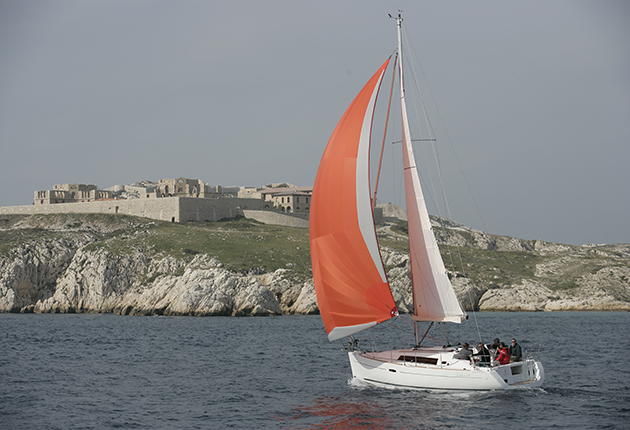
Boat owners need to carry VAT proof onboard post-Brexit
Skippers cruising to and from the UK need to prepare now for the ‘bureaucracy of sailing’ post-Brexit, the Cruising Association…

New guidance on Post-Brexit EU VAT status of second hand boats
Marine organisations in the UK and EU have come together to release guidance on the EU VAT status of second…

Returned Goods Relief conditions to be waived
The three year condition for Returned Goods Relief for recreational boats is to be dropped by the Government. It will…
I am sure boaters would not favour nominated ports of arrival and departure and therefore additional reporting requirements and procedures should be expected.
The RYA has long been aware that all movements of goods, including personal possessions, between the UK and the EU are treated in the same way as movements to and from the rest of the world.

Stuart Carruthers joined the RYA in 2005 and is their cruising manager
This means the movements are subject to customs processes, and import duties, including VAT, will be payable unless any relief applies.
In this case the relief in question is Returned Goods Relief (RGR) and is available for any goods returning to the UK, including privately owned pleasure craft, provided the conditions outlined in the legislation are met.
However, this does not address the fundamental point that HMRC is seeking to levy VAT on boats that have been legitimately bought either new or second hand and kept in the EU while we were all EU citizens.
We think this is unreasonable and we are lobbying hard so that UK owners can repatriate their boats to the UK, even if they have never been in the UK under their ownership and therefore have not been exported.
Under the VAT RGR rules, import VAT is only relieved if the importer and the exporter are the same person. Consequently, relief from import VAT is not available.
Can VAT-paid status on your boat be maintained in the UK and EU simultaneously?

A yacht which was located in the EU on 31 December 2020 and retained its EU VAT-paid status and has previously been located in the UK may be eligible for both EU and UK VAT paid status. Credit: Graham Snook/Yachting Monthly
Can VAT-paid status be maintained in the UK and EU simultaneously? For those who anticipate changing domicile between EU/UK this could be very useful, and would also allow a boat to be marketed to a wider market as VAT-paid.
I understand that EU rules would allow for an EU resident (i.e. an agent) to establish VAT-paid status for a boat owned by a resident of the UK, when it is located in EU waters.
Is this true, and does the same possibility exist for EU-owned boats in UK waters (providing they were previously EU VAT-paid, and have been in the UK in current ownership)?
Angus Abrams
It may be possible for some yachts to have the benefit of being eligible for both EU and UK VAT paid status.
An example of where this would be possible is a yacht which is located in the EU on 31 December 2020 (retaining EU VAT-paid status) and which has previously been located in the UK.
HMRC has made clear that if the yacht is returned to the UK before 30 June 2022 (or within the 3 year Returned Goods Relief (RGR) period if this runs until after 30 June 2022) the yacht would then be eligible to obtain UK VAT-paid status on return to the UK (provided that the RGR conditions are met (return within 3 years, no change of ownership or work to the vessel beyond running repairs)). [NOTE: This three year RGR condition has been dropped by the UK Government on 1 January 2022]
EU VAT paid status could then be regained if the yacht is returned to the EU within 3 years of leaving the EU (provided that the RGR conditions continue to be met).
Over time, it will be a challenge for a yacht to retain the benefit of both UK and EU VAT-paid status.
The yacht will need to visit both the EU and UK on a three-year cycle so that RGR conditions are satisfied and there may be declaration formalities associated with EU entry for non-EU established yacht owners.
When the yacht is offered for sale the owner will have the advantage of a wider market of potential buyers but upon completion of the sale there will need to be a choice made by the buyer as to the vessel’s location on sale as inevitably the eligibility for VAT-paid status in one of the territories will be lost.
Changes of domicile (as opposed to residence) are not relevant to this question.
RATS is not aware of the use of agents in the EU to obtain or retain EU VAT status.
Responding to the question: Are there cases where changing domicile from EU to UK can be considered as an exceptional circumstance allowing a one off transfer of VAT-paid assets between jurisdictions without being charged VAT?
The UK has Transfer of Residence relief from VAT when moving your permanent place of residence to the UK. This extends to pleasure craft.
To claim relief, you must satisfy all of the following criteria:
- you’ve been resident outside the UK for at least 12 consecutive months, prior to the date of moving to the UK
- you’re importing the goods within 12 months of coming to live in the UK
- you intend to use the goods in the UK for the same purpose they were used for prior to moving.
- The vessel must have been owned by you for at least 6 months prior to its importation to the UK.
You must apply in advance for the relief on form ToR1. See: https://www.gov.uk/guidance/application-for-transfer-of-residence-relief-tor1
Will my boat lose its EU VAT paid status if it leaves the EU?

EU Returned Goods Relief rules can only apply if the boat returns to the EU after no more than three years, and there has been no change of ownership or alterations to the vessel
A UK registered yacht with UK VAT Paid Status (paid in 2016) was moved to the EU before 31 Dec 2020 and has evidence of being in the EU on that date, and has now adopted EU VAT Paid Status.
The vessel is being sold by its UK owner to another UK owner, but the vessel is remaining in the EU (Greece).
If the new owners cruise only in the EU, they are fine, but they would like to cruise to Turkey, Croatia or other non-EU countries (due to the Schengnen 90-day limit) before returning to the EU (Greece), where the boat will be kept.
- If the boat leaves the EU, will it lose its EU VAT paid status and have to pay EU VAT?
- Does it matter to the EU or to Greek authorities where the vessel is registered (UK) in regards to VAT status?
- Presumably, if purchased with EU VAT status, the new owners would not be eligible for Returned Goods Relief if they brought the boat to the UK, and would need to pay UK VAT?
- The previous owner had a suit of sails made for the boat in the UK. These are being given to the new owners in the UK, who will then take the sails out to the boat. Will they need to pay EU VAT on the sails when they take them to the EU?
Simon Farmer
We are still in the early days after Brexit. The EU, governments and officials are still coming to terms with how to deal with various situations.
The answers below should be read subject to this general comment.
There is a particular difficulty in Greece where owners who have a VAT invoice in the name of a previous owner are encountering difficulties with establishing VAT paid status with local officials.
The CA is currently addressing this problem with Greek customs officials.
If the boat leaves the EU, will it lose its EU VAT paid status and have to pay EU VAT? Yes. Technically upon departing Greece the vessel is exported from the EU. It will have to rely on the EU Returned Goods Relief rules (RGR) upon its return (conditions: no more than three years away, no change of ownership or alterations to the vessel) in order to retain EU VAT paid status upon import.
Does it matter to the EU or to Greek authorities where the vessel is registered (UK) in regards to VAT status? It should not. Post Brexit it is quite likely that UK flagged vessels will be subject to greater scrutiny from the authorities of EU member states.
Presumably, if purchased with EU VAT status, the new owners would not be eligible for Returned Goods Relief if they brought the boat to the UK, and would need to pay UK VAT? Yes.
The previous owner had a suit of sails made for the boat in the UK. These are being given to the new owners in the UK, who will then take the sails out to the boat. Will they need to pay EU VAT on the sails when they take them to the EU? Technically they will have to pay EU VAT. This may or may not be enforced.
Have a Brexit VAT question for our experts? Email us at [email protected] and we will do our best to answer them.
This article was updated following the announcement that the three year condition on Returned Goods Relief is to be dropped by the UK Government
Yachting World
- Digital Edition

Second hand boats: buying a yacht in Europe
- Will Bruton
- October 19, 2022
Buying a yacht in the EU is more complicated than it once was, following Brexit, but there’s now a growing bank of knowledge on how to smooth the process. We get expert advice on some of the key questions.

Double VAT, the Schengen zone, the 180-day rule; the list of considerations when considering buying a yacht in Europe is long and, in some cases, very complex. Crucial to understanding is having a grasp of some of the legal and tax principles that govern making a purchase. The following is not intended to be comprehensive and we advise getting specialist guidance from a tax adviser or similar.
Linda Jacques, partner at LA Law, a firm specialising in marine law and yacht transactions, says the first thing you should consider is where you are going to use the yacht you’re thinking of buying. “Since leaving the EU, it is true that things have got more complicated, but the principal legal questions surrounding ownership and tax haven’t changed that much. A lot revolves around the location of the yacht,” explains Jacques. “First, before you start looking to buy, consider where you are going to flag moor the yacht.”
Jonathan Hadley-Piggin, a partner at Keystone Law, explains that location is also crucial to the transaction. “Making a purchase of a yacht within an EU country isn’t the problem people often see it to be, but you need to be clear if you are paying VAT or if VAT is already paid and provable. Under some circumstances VAT can be avoided by concluding the sale outside EU territorial waters.”

UK Border Force reporting form C1331
The VAT factor
VAT is often the first concern that comes to mind for potential buyers because it can make a 20% difference in price.
As Jacques explains, one of the challenges of Brexit is that you can end up having to pay tax again when you return your yacht to the UK.
“ Buy a yacht in Europe and keep it there and you don’t have a problem, as long as EU VAT has already been paid and can be clearly proven. Yachts within EU waters must be EU VAT paid and have proof unless the owner is able to qualify for customs relief. Customs relief includes Temporary Admission or a VAT exemption for a yacht that is operated commercially. Commercially operated yachts have their own specific requirements and need to prove the nature of their operation is truly commercial.”
Article continues below…

Second hand boats: buying an ex-charter yacht
Yacht charter companies increasingly own new yachts for only a few years, selling off sooner to ensure they can offer…

Second hand boats: how to buy a ready to sail yacht
It’s no secret that if you want to buy a new yacht the wait is now likely to be two…
However, if you are purchasing the yacht in Europe and bringing it back to the UK, proof of where the yacht has been in Europe and on what date the transaction concluded is crucial. “If you are the new owner, even if VAT has been paid before, you will be liable for import tax coming into the UK,” Jacques advises. “VAT must be paid again on all EU VAT-paid yachts being brought into the UK. In the UK the UK Border Force form C1331, where you declare the VAT status of the boat, where it has been and at what time, is an important document.”
The non-VAT paid yacht is a more complicated prospect, as Jonathan Hadley-Piggin explains. “We get calls from people thinking that a non-VAT paid yacht can’t be bought, or it’s simply too risky. It can, you just need to understand how to go about it and, if necessary, the new owner might need to pay the VAT to use it in the way they want to.
“It’s also worth considering how, as a new owner, you are proving VAT has been paid. For example, if the boat was initially purchased by a company and VAT was paid, but as a company they claimed the VAT back through their corporate accounts, it might be considered by the authorities that VAT has not been paid. It is this kind of issue that a good marine lawyer and tax adviser can help you understand fully. Quite often the current owner really does think VAT is paid and that their paperwork is correct, when in fact it is not, so it’s important to ask questions around what proof is available early on if you’re serious about buying.”
Michael Ashdown of Harwood Hutton VAT Consultancy regularly advises yacht owners. “You should be looking initially for the original sales invoice, subsequent sales invoices and/or an importation invoice; always asking the question ‘Would this satisfy an inquisitive customs officer further down the line?’
“We are now seeing an increasing number of clients who are choosing to pay EU VAT, knowing that it will ensure their yacht has true free movement within the EU without complexity.”

Paperwork checks in Europe.
Time aboard
While buying a yacht in the EU is possible for a UK citizen, being able to use it is another matter. An extended season of Mediterranean cruising for most is no longer an option, due to the Schengen restrictions meaning no British citizen can spend more than 90 days in the EU in one 180-day period. This means that some buyers looking to cruise for longer are investigating other options to allow them to stay in Europe. Remember that the rules for a yacht are separate to the rules for people.
Dave Birch bought his yacht to take a sabbatical with his wife and daughter, but found himself confronted with the prospect of a shortened season before he’d even completed the sale. “There are options, heavily dependent on your individual circumstances, but to keep cruising we have seriously investigated different ways to spend more time in Europe. Maltese residency can be purchased by investing in private property or business, granting an EU passport and access rights, but it is a serious amount of money that some would think extreme just to be able to keep sailing.
“Other options are so called ‘digital nomad’ visas, allowing those working while living afloat the potential to stay for longer and continue cruising. What is clear is that, at present, there’s no cheap or easy option.”
Many cruisers build time out of the EU Schengen zone into their cruising plans to take maximum advantage of the time allowance. For example, Croatia is not currently part of the zone.

A 2012 Hallberg-Rassy 64 for sale in Italy
Areas of confusion
Alex Grabau has been brokering yachts in Europe throughout Brexit. “There’s still a huge amount of confusion, particularly for UK buyers keen to buy second hand boats located in Europe. A lot remains unclear, even where there are written rules in place.
“Returned Goods Relief (RGR) is the most common area of misunderstanding,” he explains. “RGR is only available to boats where the importer is the same as the original exporter. If a VAT-paid boat is sold outside of the UK, the new owner may be liable to pay VAT if the boat is brought back into the UK.
“This currently also applies to UK owners of VAT-paid boats bought and then kept in the EU while the UK was still part of the EU28, which now would like to come to the UK.
“Even if the boat was originally UK VAT paid, or kept in the UK in a previous ownership, the owner and their boat may not be eligible for RGR and could find themselves with a sizeable VAT liability upon arrival in the UK.”

A 2002 Oyster 56 for sale in the Western Med
Another area of confusion relates to Temporary Admission (TA) which is applicable in both the EU (for non-EU boats) and the UK (for non-UK boats). “Many UK buyers believe they can buy a yacht in Europe then bring it back to the UK temporarily before heading off on their planned adventures. This is not the case, as eligibility for UK TA requires the boat is registered outside of the UK and used by a non-UK resident. There is no grace period offered by HMRC, so even spending a day in the UK may result in a VAT liability.”
Grabau also regularly comes up against misunderstandings about the difference between Europe and the European VAT area. “It can be unclear when a boat is sold in places such as Martinique, Guadeloupe, Saint Martin and the Canary Islands. These are all territories within the EU, but fall outside of the EU’s VAT area. Buying an EU VAT paid boat in these territories may see the VAT paid status lost.
“Care also needs to be taken when boats are in the Channel Islands as they fall outside of the UK’s VAT area.”
The right mark
While VAT issues can ultimately be resolved through writing a cheque, Grabau sees the UK’s introduction of its own build standard (the equivalent to the EU’s Recreational Craft Directive) potentially creating more hurdles.
“Bringing a yacht back to the UK market may soon be more of an issue because a compliance survey may be needed and some yachts may not be considered importable, or too difficult to import to the UK.”
Alasdair Reay is a naval architect and CEO of HPI Verification Services, a business that helps yachts comply with build standard regulations and undertakes compliance surveys. He adds: “Since leaving the EU, the UK has introduced its own CA mark. Most recently-built CE-marked yachts will not need a survey to comply with the CA standard.
“However, the UK government’s position on second-hand yachts is still not clear. If you do need a survey, the cost for a 50ft yacht would likely be £4,000-£10,000. If the build standards and technical data are available to us, it’s a cheaper paper-based exercise, but where it is not a survey can be necessary to formally document the yacht’s construction.”

Photo: agefotostock/Alamy
Buying a yacht in Europe – case study
Tim (who wishes to remain anonymous) found his ideal cruising yacht online, located in Spain. The prospect of buying a yacht in Spain following Brexit immediately posed several questions, particularly considering his cruising plans. “The yacht was UK VAT paid but had been present in the EU on 31 December 2020 and so also had EU VAT status. As VAT status does not survive a change of ownership, we had to make a choice between the ability to bring the boat back to the UK and our initial plan, which was to cruise Europe.
“We decided to maintain UK VAT status. This necessitated a survey and acceptance of the boat in the EU, followed by a Biscay crossing to conclude the sale in the UK, with all the logistical hurdles that that entailed.”
If you enjoyed this….
Yachting World is the world’s leading magazine for bluewater cruisers and offshore sailors. Every month we have inspirational adventures and practical features to help you realise your sailing dreams. Build your knowledge with a subscription delivered to your door. See our latest offers and save at least 30% off the cover price.
Select Your Region
England & Wales
Isle of Man
Northern Ireland
Middle East
- England & Wales Select Region
What can we help you with?
Use the filters below to refine the results displayed opposite.
- Clear search
The VAT problem: top tips for yacht buyers and owners
- Dr Jonathan Hadley-Piggin
- Marine & Shipping
Are you a prospective buyer or existing owner of a boat in the EU? Are you looking to import a vessel into an EU member state? Then the issue of VAT is an essential one to consider. Keystone’s yachting expert, Jonathan Hadley-Piggin , outlines the necessary considerations and points out the potential pitfalls.
Value Added Tax (VAT) is a tax scheme that was established by the EU. It is a tax on what is referred to as consumption and is levied by the government of each member state. As a consequence VAT is chargeable on boats imported into the EU and on boats purchased and owned by residents of the EU who are using their boat within the EU. VAT is also chargeable on boats, irrespective of ownership, which spend more than 6 months in any calendar year cruising in the EU, although there is scope to enable an owner to use a yacht in the EU without being liable for VAT. EU residents should only use a vessel in the EU if it is VAT paid or deemed VAT paid (see below).
Yacht owners should be aware that each member state has a certain level of discretion as regards the interpretation, implementation, administration and enforcement of the EU legislation regarding VAT. This can cause difficulties in interpretation and of course why different member states charge VAT at different rates. Normally, VAT laws of the member state are enforceable by the relevant customs authority. It should be noted that the Channel Islands and Gibraltar are considered outside of the EU VAT area but the Isle of Man is.
A yacht owned by an EU resident or corporate body has the right to free movement throughout the EU provided VAT has been paid on that boat in an EU country. Please note, however, that if you spend more than 6 months in some countries you may become subject to local regulations. It is also important to ensure that whenever sailing in the EU you carry evidence of VAT payment, such as the builder’s receipt or paid invoice or a VAT certificate which some EU States provide. Alternatively, you must keep on board the document(s) issued by Customs or other relevant authority stating the reason for any exemption.
Should VAT have already been paid on the yacht, and if so, has it?
All yachts built in or brought into the EU on or after 1 January 1985 must be able to prove their VAT paid status. A boat built before this date is deemed to have VAT paid status if it was in private ownership and within the EU at midnight on 31 December 1992. Proof of this may be required by the local customs and can be difficult to provide as log books, marina receipts or invoices going back that far have often been lost or destroyed or simply not passed on as ownership has changed hands. If documentary evidence of the location of the vessel on 31 December 1992 cannot be provided you should provide whatever documents you have so that the local customs may form a view as to the location of the boat based on the documents you do have. Some sales have fallen through because such information cannot be provided and a potential buyer has an increased risk of being stopped and fined for a not having a VAT paid boat.
If the yacht is advertised as VAT paid it is important to request documentary evidence of this from the seller or their broker. For yachts built after 1 January 1985 the VAT should have been paid by the initial purchaser or importer. Evidence could by way of a receipted invoice or VAT certificate. Ideally you would want the original, but in the absence of this certified copies may be accepted. If the yacht is being sold by a company you will need to check whether it reclaimed any VAT paid when it purchased the yacht and thus the boat is now deemed VAT unpaid – a good point for brokers especially to consider.
If VAT should have been paid and was not, or there is no proof of the boat’s VAT status or the owning company paid and reclaimed VAT then the liability for paying any VAT due lies with the current owner and will pass to the purchaser on his/her purchase of the yacht.
Can a boat lose its VAT paid status?
If a yacht with VAT paid status is exported from the EU it will usually qualify for relief from having to pay VAT again if it is imported back into the EU within 3 years of its export, provided that it is imported by the same person who exported it, i.e. no change of owner whilst outside the EU. However, this will not exempt it from any customs duties that maybe apply. If your boat will be exported for more than 3 years you should check the position with customs.
If VAT has not been paid, when is it due?
VAT is payable on the happening of a chargeable event. A chargeable event occurs where the yacht is imported into the UK or is sold by a business in the course of its business.
If you are buying a new yacht from a VAT registered seller in the UK then VAT is payable on the purchase price. If the seller is VAT registered in another member state but the yacht is kept in the UK different rules apply in order to determine whether the VAT is due in the UK or the country of incorporation of the seller.
If you are buying a second hand boat and the seller is VAT registered, then VAT may be due on the sale price. The general rule in the UK is that if the yacht has increased in value since the date of purchase by the seller, VAT will be due on the amount by which the value has increased, even if VAT was previously paid on the purchase of the yacht and has not been reclaimed. The buyer will be liable to pay any VAT due. If the seller is not VAT registered no VAT will be payable on the purchase.
If you are buying a yacht from a business that does not charge VAT on the sale or from a private individual in the EU and the seller advises that VAT has previously been paid, you should obtain evidence from the seller or broker that VAT has previously been paid.
In respect of yachts imported from outside to within the EU, VAT should be paid at the time and place of import. It is assessed on the value of the yacht at the time of import. Customs will not necessarily rely on the value stated on the invoice or contract, they may seek valuations from brokers if they consider there has been an under-valuation.
An importer resident or incorporated in the EU should have paid VAT on import, even if the boat is registered in the Channel Islands or Gibraltar.
What if the VAT status cannot be proven and there is no chargeable event?
Some customs authorities may be prepared to look at the documentation available (and therefore any available receipts or log books should be kept) and may issue a letter of comfort that they yacht is considered by them as VAT paid. However, this is unusual and not a practice that is followed in the UK. In any event, such a letter is not proof that VAT is deemed paid. In respect of yachts build before 1 January 1985 and in the EU at midnight on 31 December 1992 such documentation and requests for a letter of comfort should be submitted to the customs authority in the country where the yacht was on 31 December 1992.
Tax is rarely straightforward and VAT in relation to yachts is no different. It is very rare that there is a simple yes or no answer. You should always obtain evidence of the VAT position before purchasing a boat.
Click here to receive free legal updates direct to your inbox
Share this article
For further information please contact:
- T: 020 3319 3700
- Send an email
This article is for general information purposes only and does not constitute legal or professional advice. It should not be used as a substitute for legal advice relating to your particular circumstances. Please note that the law may have changed since the date of this article.
Other Recent Articles
Lidl v tesco trade mark infringement claim: tesco loses at court of appeal over use of clubcard logo, buying and selling smart devices: sep licences and competition law, what are the changes to the skilled worker sponsorship salary, what does the 2024 spring budget mean for non-doms, are overseas relationships recognised as civil partnerships in england and wales, what do the fine increases for employing illegal workers mean for businesses, can i share my employee’s health information in a mental health emergency, how will the amended paternity laws impact employment, spring budget 2024: an overview, why is a brand protection strategy an important business asset, do you have to negotiate in “good faith” before you can sue, how can bankruptcy petitions help recover debt.
Clicking the Accept All button means you are accepting analytics and third-party cookies ( check the full list ). We use cookies to optimise site functionality and give you the best possible experience. To control which cookies are set, click Settings.
Our use of cookies.
You can learn more detailed information in our Privacy Policy
Some cookies are essential, whilst others help us improve your experience by providing insights into how the site is being used. The technology to maintain this privacy management relies on cookie identifiers. Removing or resetting your browser cookies will reset these preferences.
Essential Cookies
These cookies enable core website functionality, and can only be disabled by changing your browser preferences.
Google Analytics cookies help us to understand your experience of the website and do not store any personal data. Click here for a full list of Google Analytics cookies used on this site.
Third-Party cookies are set by our partners and help us to improve your experience of the website. Click here for a full list of third-party plugins used on this site.

EU VAT on Yachts Explained – Interview
What is the VAT treatment of the sale of a yacht?
Primarily it would be pertinent to assess whether the transaction falls within the scope of VAT, meaning that it is effectively supplied by a taxable person acting in the normal course of his business, takes place in the Community and a consideration is received in return for the supply rendered. Once falling within the scope of VAT the transaction should be analysed using the methodical approach.
Does the VAT treatment change if the yacht is sold second-hand?
Yes. In principle where a yacht is sold second-hand by a taxable person who had a right to deduct input VAT upon its acquisition then VAT must be charged on the current value of the yacht. On the other hand, where the sale of a second-hand yacht is being made by a person or entity that had no right to deduct the input VAT upon its acquisition, the transaction shall fall outside scope of EU VAT and hence no VAT is chargeable. Another, however improbable, scenario would be the transfer of a yacht made by a second-hand dealer, in which case the VAT would be charged only on the profit registered by the second-hand dealer.
Does the VAT treatment differ where the yacht is supplied in the EU or outside the EU?
Yes, definitely. Where a yacht is purchased outside the EU territorial waters, what is commonly referred to as “a sale on the high seas”, its entry into a Member State of the EU would be treated as an importation, with VAT to be paid to the Customs authority of the Member State in which the importation takes place, for the yacht to be released into free circulation. This, unless the payment of the import VAT is authorised to be deferred by the tax authority, generally in a situation where the yacht will be used to carry out commercial chartering operations that are subject to VAT.
On the other hand, if purchased within the EU, it could be a domestic supply (if the supply takes place within the territory of a Member State) or if supplied cross-border, an intra-Community transaction (meaning an exempt IC supply by the supplier in the Member State of origin and a taxable intra-Community acquisition by the purchaser in the Member State of destination). The purchaser has to be a taxable person identified for VAT in the Member State of destination. If the purchaser is not a taxable person, the cross-border supply could classify as a distance sale of goods, taxable in the Member State of the customer. Mention must also be made where a yacht is acquired as a “new means of transport”, which is a vessel exceeding 7.5 metres in length, not to be used as a commercial vessel, with not more than three months since first entry into service or with not more than one hundred hours in sail time. The VAT on the acquisition of a new means of transport is payable by the person making the acquisition in the Member State where the transport of the new means of transport to that person ends.
May the VAT chargeable on importation be deferred and what does that mean?
In principle, the importation of a yacht is taxable with the importer required to pay VAT to the Customs authorities in order for the yacht to be released for free circulation within the EU. However, at the discretion of the Commissioner for Revenue, the payment of VAT upon the importation of a yacht taking place in Malta can be deferred. In other words, the VAT is not paid as it is considered to have been deferred to the VAT return.
What are the conditions which would allow for a VAT deferment at importation in Malta? Is a bank guarantee always required?
In practice, to be considered for deferment the importation has to be carried out by a taxable person registered for VAT purposes in Malta who must show to the satisfaction of the Office of the Commissioner for Revenue that he will be using the imported yacht to carry out commercial chartering operations. Currently, Malta incorporated companies are not required to set up a bank guarantee, but foreign incorporated companies are required to set up a bank guarantee calculated at 0.75% of the import value of the yacht capped up to EUR 1 million.
What is meant when a yacht has a “VAT paid” status?
“VAT paid” status means that the VAT due on the yacht had been accounted for and paid to the Tax authority without the possibility of it being recovered or refunded. A Customs import payment receipt, an invoice or fiscal receipt issued by the seller (a taxable person), or a certificate issued by the Office of the Commissioner all bear testimony to the “VAT paid” status of a yacht and may become useful when the yacht enters the territory of another Member State and the VAT status of the yacht needs to be shown.
Can a yacht forfeit its “VAT paid” status?
In addition to serving as evidence that the VAT had been paid, the “VAT paid” status implies that the yacht is in free circulation within the territory of the EU Community, meaning that it can cross and enter the territorial waters of the respective Member States without being subjected to further Customs formalities, such as those at importation. The VAT paid and free circulation status are not perpetual and can be forfeited if the yacht leaves the territory of the EU and is then re-imported by a person other than the one who had exported it or where the yacht is taken out of the territory of the EU and re-enters into the EU beyond a period of thirty-six months even though it is imported by the same person who had exported it.
How is yacht chartering treated for VAT purposes?
In principle yacht chartering is treated as a taxable supply. An exemption technically applies where a yacht is chartered to another taxable person who would be using the yacht to himself carry out commercial chartering operations. As a matter of fact, the European Court of Justice in the Bacino case had ruled that this exemption shall not apply to services consisting of making a vessel available, for reward, with a crew, to natural persons for purposes of leisure travel on the high seas.
Are there any practical arrangements for the acquisition of yachts in Malta?
Yes, there are two, one being the Malta yacht leasing arrangements, that is based on the concept of “use and enjoyment” clause in the VAT Directive and which provides for the taxation of only that portion of the lease where the yacht is used and enjoyed within EU territorial waters. Conversely the use outside EU territorial waters is not taxed. The calculation of the taxable/exempt portions has to be made by the lessor on the basis of documentary and technological data of the yacht’s time spent within or outside the territory of the EU. The other practical arrangement, which is supported by a European Court of Justice decision in the Weald Leasing case, entails the long-term leasing of the yacht to the UBO. The lessor would be a company set up by a UBO with the UBO financing the purchase of the yacht by the company with the loan being set-off against the monthly instalments due by the UBO for the leasing of the yacht. The structure has the benefit of extending the payment of VAT relating to the yacht over a long period of time rather than having to pay the VAT at one go, as would have happened had the yacht been purchased outside of this arrangement under the normal VAT rules.
Meet us at the Monaco Yacht Show from the 27th to 29th September.
Book a meeting with us here.


Matthew Zampa
Founding partner.

Christabel Spiteri
Full name *, your company *, email address *, phone number *.
Please leave this field empty. I consent to Zampa Debattista storing my personal data provided for the sole purpose of responding to my enquiry and administering my request, as defined within the privacy policy .
Send Sending..
Previous Post VAT Newsletter - Q3 2022
Next post eu funding for digitalisation and energy efficiency investments.
Comments are closed.

- Student Hub
- Engagements
- Corporate Services
- Financial Reporting
- Internal Audit
Quick Links
- Get in touch
- Privacy Policy
© 2024 Zampa Debattista.
crafted by BRND WGN
- History & Values
- ESG & Sustainability
- Meet the Team
- Engagement Quality
- ACCA Programme
- University Programme
- Internship Programme

- Berthon Home
- Yacht Brokerage
- New Yacht Sales
- Boatyard & Marina
Your Local Broker, Internationally
Berthon UK (Lymington, Hampshire - UK) Sue Grant [email protected] 0044 (0)1590 679 222
Berthon France (Mandelieu La Napoule, France) Bruno Kairet [email protected] 0033 (0)4 93 63 66 80
Berthon Scandinavia (Henån, Sweden) Magnus Kullberg [email protected] 0046 304 694 000
Berthon Spain (Palma de Mallorca, Spain) Simon Turner [email protected] 0034 639 701 234
Berthon USA (Rhode Island, USA) Jennifer Stewart [email protected] 001 401 846 8404
- The Berthon Book
- Yacht Market Report
- The Berthon Collection
- Berthon International e-Newsletter
- Berthon Scandinavia
- Berthon Spain
- Berthon USA
- Discovery Yachts
- General News
- Pegasus Yachts
- Press Releases
- Solaris Power
- Solaris Yachts
- Windy Boats
- Yacht Sales - Brokerage Yachts
- Yacht Sales Insights
- Blog Category Sitemap
- Berthon.co.uk Blog
In which jurisdiction, in the EU or UK, is it best to pay VAT on your yacht? by Sue Grant
November 20th, 2020
A rough transcript of a Berthon podcast, which we hope you will enjoy.
With our impending exit from the EU now looming at the end of 2020, the yachting community find themselves faced with a lack of clarity on VAT status with regards to their yachts. Will yachts retain their VAT paid status and if so, will they still be considered VAT paid in Europe? Are yachts in danger of losing their UK VAT paid status if not in the UK? This situation is in flux and both British Marine and the RYA are lobbying hard to obtain clarity on the subject.
Now that there is a practical possibility to choose between the EU VAT paid status and UK VAT paid status, people are beginning to ask which is better, particularly financially – particularly when they come to sell their yachts. As yacht brokers we spend our lives working in the international market place and residual value is a key factor that we have in the back of our minds always.
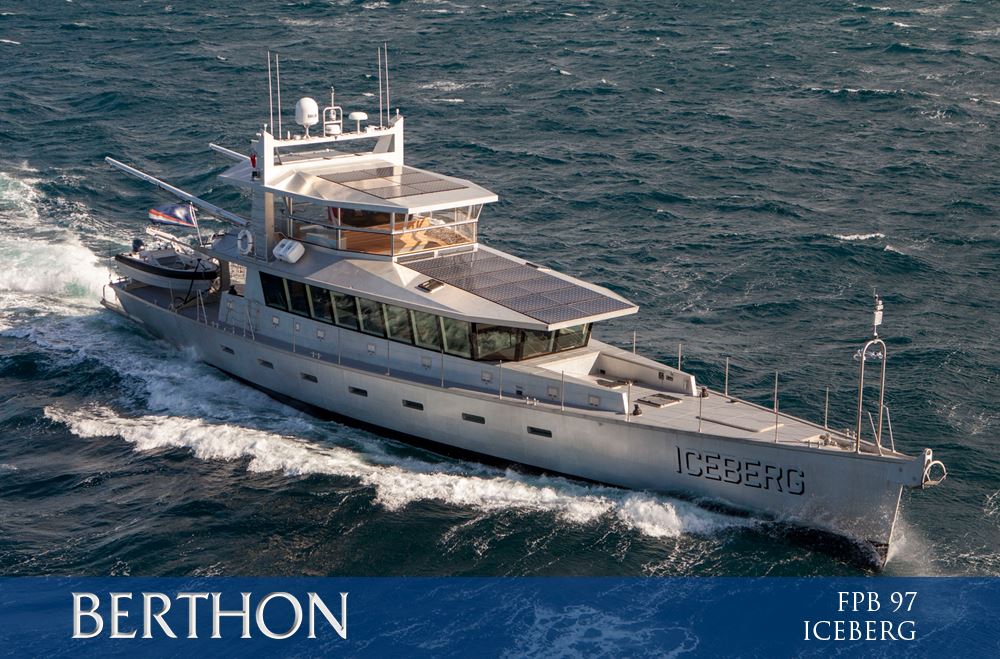
FPB 97 (ICEBERG) – Yacht for Sale – [OFF MARKET]
Yachting is all about fun with family and friends, unique experiences and making life long, happy memories. You pay for these in the real world, and you pay when you yacht in the same way. Here are the facts currently:
- If you are sailing and keeping your yacht in the UK – she must be VAT paid. This trumps all.
- There is a possibility that she can be VAT paid in both UK and EU. In all circumstances, this is of course ideal, but not a certain outcome.
- In very general terms the European market is larger than UK so err towards being VAT paid in that market.
- When the Malta VAT scheme was in operation, VAT paid was worth 10%. It doesn’t seem to be that much more now, but we will see.
- Don’t underestimate how many non-EU yachtsmen yacht in Europe – Americans, Australians, Russians, Norwegians and the rest. No VAT payment is therefore not a disaster, although your European buyer will tell you it is.
- A European purchasing a non VAT paid yacht will only pay VAT on the purchase price.
- There remain huge advantages to having a non VAT paid yacht and keeping her in Europe on the TA scheme as when she sells, the buyer will only pay on the purchase price. The advantage here is that the yacht pays VAT just once (rather than a UK VAT paid yacht which in effect must pay it twice coming into Europe) and only at the depreciated level.
So what is best VAT paid in UK?
- Anything that you are using in the UK.
- Inland waterways which are not suitable for the European canals.

Because of our waters, the size band is likely to range from dinghy to probably 40 or 50 feet. We have amazing waters at home and it is a shame not to use them. Please do not avoid our waters as you had originally intended just because you own, for example, a Princess V60 or a Southerly 570 and you are worried about the double VAT problem should you possibly sell to a European in the future.
The fact is that a market for VAT paid yachts will develop in the UK. There will be less UK VAT Paid yachts in the future, as many will migrate to Europe (particularly with new yachts where there is nothing not to like about azure seas, sunshine and a 20% cost saving). As a result, your yacht may well be more in demand over time, particularly if she is quite new.
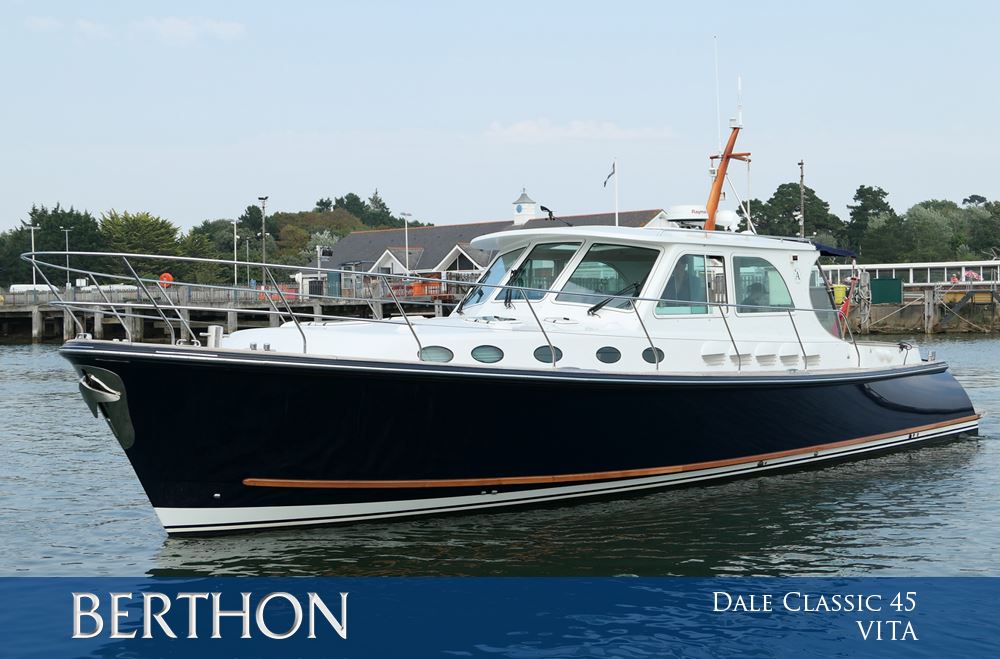
Dale Classic 45 (VITA) – Yacht for Sale – [OFF MARKET]
For everything else – European VAT paid is the best.
Do not think that a British manufactured yacht is best UK VATed. We sell Rustlers in the USA as new, Oysters throughout all five of our offices and also Princess, Fairline, Sunseeker, Spirit, Gunfleet (RIP), Discovery, Southerly and all the rest. British yacht manufacturers have always exported massively to Europe and beyond to the rest of the world.
Do not rush to pay European VAT on what you own. Hold tight and have a day of reckoning when you sell the yacht. Sadly she is a depreciating asset and her new European owner will pay less and you will do better.
So we find ourselves with 3 options on the table:
- VAT paid in UK.
- VAT paid in the EU.
- Not VAT paid.
We like the third best. It has so many wonderful possibilities and allows you to sell not just in Europe but to the rest of the world. The EU is a big market but looking forward we are seeing other nationalities embrace motor yachting, bluewater sailing and the rest. We are not economists but we see that new growing markets will become more significant and who knows the landscape when you give your yacht her marching orders?
Other important things to take into consideration are:
- RCD – a must.
- Wiring – dual 50/60 cycle very important.
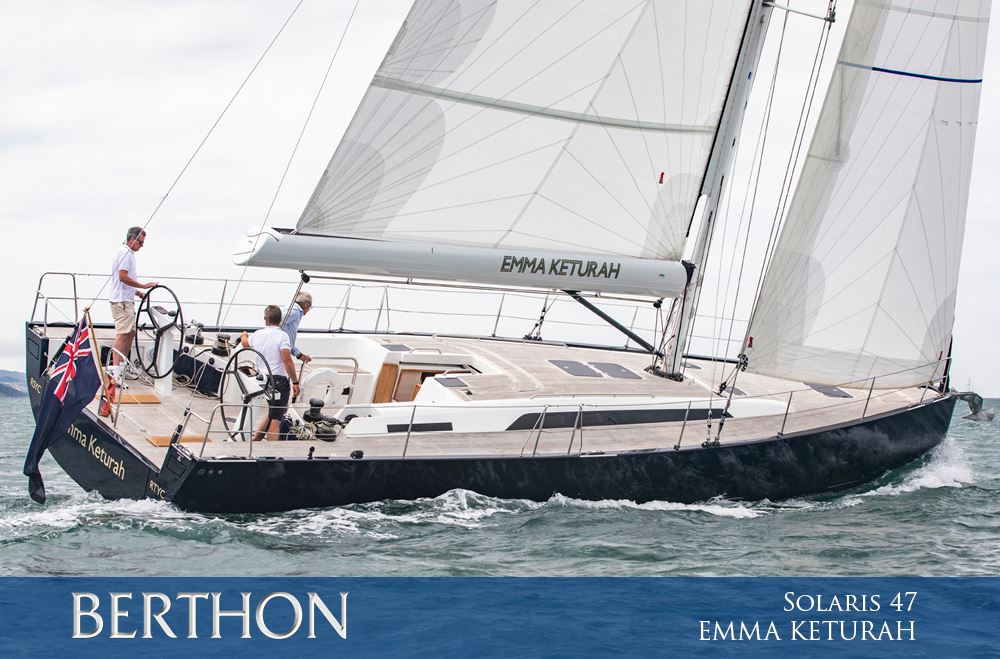
In the UK we are a little island. Europe is a bigger market but it is somewhat smaller than the planet so in owning and selling a yacht consider all the aspects that will make her attractive going forward in the world market…
Above all, remember that a yacht is a joy so the message is pay the VAT where you will use the yacht, follow all the rules and if it means paying no VAT at all, then this is the very best of all worlds.
Contact [email protected] .
Search BerthonInternational.com
EU VAT and Yachts
SUPER YACHTS
Frequently Asked Questions Regarding EU VAT & Yachts
Introduction
For owners sailing within the EU, EU VAT is a crucial issue that occasionally influences the choice of yacht registration. To address some of the more frequent queries boat owners have regarding EU VAT, we have created this FAQ document:
1. What is the general guideline for yachts and EU VAT?
Unless the owner is eligible for a customs relief, such as Temporary Admission, or is eligible for a VAT exemption, such as the operation of the vessel for legitimate commercial purposes, all yachts sailing within EU waters shall pay EU VAT. Pay VAT if unsure.
2. If I live in the EU and use my yacht there for personal enjoyment, must I pay EU VAT on it?
Yes, the EU authorities will anticipate that your vessel has paid its VAT.
3. If I own and/or register my boat in a non-EU country while living in the EU and using it for private enjoyment, are I able to lawfully avoid paying VAT?
No, the EU authorities “look through” any non-EU ownership and/or registration that a yacht may have in order to assess the yacht’s VAT responsibility based on the domicile of the major users of the vessel, or, to put it simply, the person(s) who are using the yacht for recreational purposes. 4. Can I avoid paying VAT on my yacht by running it as a yacht charter business?
4. Can I operate my yacht as a yacht charter company without having to pay VAT on it?
In a few specific cases, yachts operated as legitimate businesses may be excluded from paying sales tax. On our website, at the following link, you may find a handbook we created on some of the fiscal and legal aspects of yacht charter in the EU, which includes a section on VAT exemption:
A Guide to Yacht Charter in the EU
The European Union’s Yacht Charter Regime
This guide’s main goal is to outline some of the most important legal and financial factors for yacht chartering in the EU.
Ownership of a yacht
Choosing a suitable location for the development of a corporate structure to own the boat and operate the charter business is one of the crucial initial tasks.
Registration of Yachts
It’s crucial to choose the best flag state for the yacht’s registration concurrently with setting up the yacht charter firm.
The nationality of the yacht and, thus, the appropriate operating system, are determined by the registration of the yacht. Yachts used for commercial purposes, such as charter, must have a registration that enables them to operate legally under the laws of their flag state.
In terms of port state control, it is crucial to choose a flag state that ranks highly under the Paris Memorandum of Understanding and offers yacht-friendly interpretations of global marine regulations for commercial boats.
The optimal location to incorporate the yacht charter business will mostly depend on the client’s own personal circumstances, thus the owner will typically consult their accountants for legal and tax guidance.
It is usual practise to utilise EU firms or a company formed in a nation or territory with which the relevant EU member state where the vessel will charter has a double taxation agreement to avoid cabotage restrictions and withholding tax on charter income.
Operation of Yachts
Consideration must be given to how the yacht will abide by operating standards and regulations, such as minimum safe manning levels, safety management systems, and labour laws, in addition to choosing the flag state.
Fiscal Responsibility
It is crucial that the yacht charter operation is carried out in accordance with any applicable local laws and appropriate EU fiscal requirements, for instance:
The yacht ought to be formally brought into unrestricted use within the EU.
The yacht-owning firm and the vessel must adhere to all applicable local VAT and fiscal laws, which includes registering for VAT in the member states where it will start accepting charter bookings.
All charters (even those conducted by the underlying owners and their friends or family) must be charged with VAT and be accounted for.
Income must be disclosed and, when necessary, tax must be paid to the appropriate member state.
Exemption from VAT
Under certain conditions, yachts that are operated as seriously pursued commercial operations may be eligible for VAT exemption on the yacht itself and some suppliers.
Different EU member states have different “business tests” to determine if an activity qualifies for VAT exemption, but generally speaking, the authorities look for the following commercial features in a legitimate yacht charter firm:
The vessel must be marketed for charter at an acceptable market rate in comparison to other similar vessels, and a central professional charter agent must be hired.
All visitor use of the vessel (including use by the underlying owners and their friends or family) must be done so according to a charter agreement.
The quantity of genuine third-party charter activity should be proportionate to the amount of charter by the owners of the underlying vessel and their friends or family.
The owning firm must be able to prove that charter proceeds were deposited into a corporate account.
In conclusion, any agreement whose primary goal is to get a VAT benefit, and which lacks an underlying commercial objective may be challenged by the EU authorities as being abusive.
The following guidelines from the UK HMRC outline potential signs of an abusive practise and can be used to determine if a yacht charter structure is abusive:
The existence of one or more of the following characteristics (the list is not inclusive; the indicators are illustrative of the factors that HMRC may consider, along with others) may suggest an abusive structure:
The ultimate owner of the chartering or leasing organisation is the primary user of a pleasure vessel.
A pleasure craft’s primary user (directly or indirectly) paid for the purchase.
During the busiest season for chartering, the person who (directly or indirectly) paid for the purchase of a pleasure craft makes frequent use of the boat.
It would need more consistency and substance than simply renting out a pleasure boat to other people to qualify as an economic enterprise.
The chartering or leasing entity’s financial statements reveal large continuous losses.
The primary user of a pleasure vessel is required to pay charter fees or lease instalments, which are solely handled on paper (for instance, by offsetting them against debts).
Less than open market value is paid in charter fees or lease payments.
The terms of a lease are notably different from customary business practise (the lease’s duration, for instance, is unusually long).”
Warning and Conclusion
Before beginning any boat charter activity in any nation, we always advise seeking local guidance because yacht charter regulations differ significantly between EU member states.
5. Does my yacht need to have EU VAT paid if I am a non-EU resident using it for private enjoyment in the EU?
If you can adhere to the EU regulations for Temporary Admission, you could be able to keep the vessel inside the EU without paying. For more details, see this link to our online manual:
Yachts in Europe: Temporary Admission (Temporary Importation)
This guide’s objective is to provide additional details about the Temporary Admission Relief from VAT for boats accessing EU waters.
Temporary admission, also known as temporary importation, is a procedure that permits non-resident yacht owners to bring their vessels into Europe for a brief period of time, such as a vacation, and subject to certain restrictions without having to pay VAT on the value of their vessels.
Such a method is necessary because without it, many non-EU resident boat owners would simply avoid travelling to European seas because the expense of paying VAT upon arrival would be too high.
Criteria for Temporary Admission
The primary prerequisite for a boat to be approved for Temporary Admission is that it must be owned by a natural person (i.e., an individual) or a legal person (i.e., a company) who is established (i.e., a resident) outside the VAT territory of the EU.
Time Allowed for Temporary Admission
After its first arrival, the yacht may only be utilised within the EU for a maximum of eighteen months. If the vessel is lay-up and typically bonded with the advance consent of the authorities, this time period may be extended under specific circumstances up to a maximum of 24 months.
Restrictions for Temporary Admission
In reality, it does not suffice for a yacht to be owned by a natural person or a legal entity based outside of the EU. The authorities always check to see if a certain vessel has non-EU ownership listed on its registry, and they pay great attention to how a specific vessel is being operated.
This indicates that they would anticipate the vessel’s chief user, i.e., the person or persons who are the yacht’s primary users, to be located outside the EU’s VAT jurisdiction.
Therefore, the main users of yachts sailing within the EU on Temporary Admission should be ready to show the authorities proof that they are indeed not based in or a resident of the EU.
Entry into the EU with Temporary Admission
The following is stated in the official EU handbook to temporary admission:
“In most cases, it suffices to simply cross the border of the Community’s customs territory. However, customs may compel you to follow a particular path and submit either an oral or written customs statement. In order to cover the payment of the customs charges and VAT that become payable if the boat does not leave the EU, they might demand the supply of some sort of security or guarantee.
The main takeaway from this message is that formalities differ from country to country. It is crucial that a yacht owner who wishes to enter the EU under Temporary Admission carefully chooses their EU entry point and is aware of what formalities are required upon arrival before travelling there.
Temporary Admission – Exiting the EU
When terminating Temporary Admission after leaving the EU and arriving at a non-EU port, caution should be exercised. It is crucial that the owner of the yacht is aware of all the formalities needed to exit from the EU, and they should also check to see whether any documentation is needed for arrival in an EU country or any other countries they visit in between.
According to the official EU guidance on temporary admission, a boat must be outside the EU for the following amount of time before it can enter again:
You are not constrained to a single temporary import period, yes. The yacht can be sailed out of the EU, and a fresh temporary importation period can start when you return for another vacation. The customs regulations do not stipulate a “minimum period” in which the products must stay outside of EU customs jurisdiction.
Charter for Temporary Admission
Only yachts used for personal pleasure are theoretically eligible for Temporary Admission.
The ability to charter yachts operating under Temporary Admission relief has recently become available in some EU member states, but usually with the requirement that the charter guests must not be citizens of the EU and with the caveat that the owner and vessel comply with all applicable legal and fiscal requirements.
Sale of the Vessel – Temporary Admission
The terms of the relief would be broken if a yacht was sold while the owner was residing in the EU under temporary admission.
Boat shows: Temporary Admission
The particular Temporary Admission exemption for a means of transport will not apply if a yacht is temporarily imported for reasons other than cruising. For instance, the Temporary Admission relief for exhibits would be appropriate if a yacht were temporarily imported for a boat display.
Refit and Repair Admission on a Temporary Basis
A boat will not be eligible for temporary admission if it is being imported for the purpose of extensive overhaul, refitting, or refurbishment. IPR (Inward Processing Relief) would be appropriate in this situation.
We usually advise seeking local guidance before cruising in any specific nation because the regulations for the Temporary Admission of boats vary significantly between EU member states.
6. Where do I pay the yacht’s VAT?
The fundamental requirement for a new vessel purchased by a private individual from an EU VAT registered supplier is that VAT must be paid in the EU member state where the vessel will be consumed (i.e., used/kept principally).
In order to prevent private owners from acquiring a yacht in an EU member state with a low VAT rate and then using the yacht in an EU member state with a higher rate of VAT, this treatment is outlined by EU VAT rules relating to New Means of Transport.
According to the New Means of Transport regulations, a new vessel is any boat that is over 7.5 metres in length overall, has been in operation for less than three months, or has gone less than 100 hours under its own power.
The fundamental rule is that VAT must be paid in the EU member state of importation or in the EU member state where the vessel is located at the time of purchase for a vessel purchased by an individual that is not a New Means of Transport.
7. Is it possible to postpone or lower the amount of EU VAT that I must pay on a private yacht through a leasing or renting arrangement?
We advise exercising caution if the yacht leasing and/or rental scheme being considered is a mechanism designed principally to postpone and/or minimise the amount of VAT due on the purchase of a private yacht made in the EU or imported into the EU.
The fundamental consistency of these schemes, despite the fact that their approach varies greatly, is the construction of an artificial structure to exploit the usage of an EU VAT registration in order to achieve a financial advantage that a private yacht would not otherwise be able to take advantage of.
Given the constantly changing EU caselaw and current investigations by the EU Tax Commission, such strategies are not without danger and are probably best avoided.
8. Is an old yacht still eligible for VAT reimbursement?
Certain yachts that were being used as private pleasure craft at the time the EU single market was established are “deemed” to have had VAT paid under the Age-Related Relief Scheme under the EU Single Market transitional procedures.
It must be proven that a yacht was both moored in the EU on December 31, 1992, and in use as a pleasure craft on January 1, 1985, for it to qualify for this programme.
The essential dates are “in use before 1 January 1987 AND moored in the EU on 31 December 1994,” as Austria, Finland, and Sweden joined the Single Market two years later.
Given that it appears there were no official transitional plans put in place for yachts to become “deemed” VAT paid, the situation for nations that later joined the EU is less clear. In general, before presuming that their vessel can be considered to have “deemed” VAT paid, we highly advise owners to contact the relevant EU member state for detailed guidance.
9. Can a boat with EU VAT lose its VAT-paid status?
Yes, a yacht that has paid EU VAT may no longer be considered VAT paid. Examples of how a yacht could cease to be VAT-paid include:
If the owner was VAT registered and qualified to reclaim the VAT they paid on the vessel acquisition, the VAT paid is reclaimed; or
the vessel is sold while being physically outside of the EU’s VAT territory; or
The ship has been physically outside the EU for more than three years.
Additionally, a vessel may no longer be regarded as fully VAT paid if major upgrades or modifications are made to it without EU VAT having been paid on those improvements or modifications.
Recent Posts
Commercial law new starter guide.
Commercial lawyers: what do they do? Commercial solicitors represent companies and organisations, offering ongoing advice regarding their operational and trading needs. They support senior management
World Trade Organisation Overview: Structure and Regulations
An introduction to the basic principles of trade Structure of the WTO agreements Signed in Marrakesh, the agreement that forms the institutional and legal structure
An Overview of the Validity of a Will
Introduction to a Will A will is a legal declaration of a testator’s intentions for items to be implemented on or after their death, made
Overview of UK Company Types
With connections to relevant resources, this synopsis references the information included in the subtopic Types of UK Companies. Almost 4.5 million firms are listed on
Superyacht Law
Contents Design and construction What does the owner anticipate the designer to deliver? Will the superyacht’s performance oradherence to legal requirements be impacted by the
Registration of Aircraft
We always advise owners to get in touch with us early on in the acquisition process, ideally before any manufacturer agreements or purchase contracts are

- Register as a Guest
*You will receive a confirmation email to login as a guest

BUYING A YACHT IN EUROPE LEGAL AND TAX CONSIDERATIONS TO KEEP IN MIND
- Posted 03-14-2017
- Brokers Worldwide Economy
- International Tips
It is often said that the Mediterranean is the crown of the world yachting industry and Monaco is the jewel in that crown. But to enjoy the Mediterranean to the full, it is essential to navigate what can appear to be a minefield of legal and tax legislation and regulations.
In this article, I have highlighted some of the general legal and tax considerations that need to be considered by anyone buying a yacht that will be sailed/used fully or partially in the Med.
Location, location, location
The place the yacht is purchased and the owner’s place of residence will determine what tax and duties may be due upon purchase. These are usually VAT and transfer tax or import duties. In general terms, any EU resident who buys a new build or secondhand yacht that is not VAT-paid will be required to pay VAT on the hull at the VAT rate applicable at the place of delivery, unless the yacht is acquired for commercial purposes or through a leasing scheme.
The rules are different for non-EU residents, who are permitted to use private yachts in the Mediterranean under Temporary Admission for up to 18 months without being liable to pay VAT on the hull. Alternatively, a commercial yacht that is registered offshore and owned is exempted from VAT, providing the vessel has been imported in accordance with the applicable regulations.
To determine the exact legal and tax status, it is necessary to complete an analysis of the operational tax and flagging issues and to consider, on an individual basis, the nationality and residence of the yacht’s intended users, cruising waters, and any potential chartering activity.
The owner’s tax residency
The tax residency of the yacht owner is paramount, especially for issues related to the taxation of income generated by the yacht or potential capital gains on its sale. Indeed, the tax to be paid will vary depending on the legal structure selected. In addition, consideration must be given to the provisions of any applicable double tax treaties, as some include special rules for the taxation of profits arising from the operation of ships and yachts.
Some countries, for example France, have introduced a special wealth tax that is a levy on the total net value of an individual’s personal assets, which includes yachts. Yacht owners who are tax residents in such countries may be subject to this taxation, depending on the yacht’s net value. Other countries may tax the individual on his or her use of a corporate-owned yacht as a benefit-in-kind.
It is also important to verify the applicable Controlled Foreign Corporation (CFC) rules in the country of residence of the Ultimate Beneficial Owner (UBO) who owns the yacht through a company, which could result in various tax constraints. For example, under new Russian CFC legislation, a Russian tax resident may be subject to tax on the undistributed profits of any foreign entity that he or she controls at the rate of 13% (if an individual), 20% (if a corporate entity) or both (20% at the level of the foreign entity and 13% at the level of the individual after profit distribution).
CRS and disclosure of beneficial ownership
The effect of the recently introduced Common Reporting Standard (CRS) for the exchange of tax information also needs to be borne in mind. As a result of the lack of clarity that continues to surround the implementation of this legislation, there is uncertainty about the nature and quality of the information that will be reported to the tax office of the UBO in his or her home jurisdiction on any yacht-owning structures. The UBO should determine what information is held on file by any relevant financial Institution, how they have identified and classified the relevant reportable persons and Controlling Persons, and what account balances will be reported, prior to the reporting taking place.
UBOs need to be aware of transparency developments in other jurisdictions that might lead to the public disclosure of the UBO’s yacht-owning structure.
Asset protection and estate planning
The main question regarding a yacht, in common with other assets, is the determination of the law that is applicable to the individual’s
estate. The material inheritance law is determined by the application of the conflict of law rules that determine the applicable jurisdiction for the settlement of the estate.
The conflict of law rules may designate a sole inheritance law to the whole estate, including both movable and immovable assets wherever situated, or two different laws, one applicable to movable assets and the other to immovable assets.
If different laws are applicable, the yacht or the yacht-owning entity will be considered as either movable or immovable assets by the jurisdiction charged with the settlement of the estate.
In general terms, common law jurisdictions allow complete freedom of disposition, while others and in particular, civil law jurisdictions,
impose forced heirship rules that limit the freedom of a testator to dispose of his or her estate.
As a yacht is a very valuable asset, special precautions should be taken to choose the most suitable tools with regard to the owner’s personal and family situation and estate planning, as well as will, life insurance, pre- or post-nuptial contracts, gift, and business succession plan.
The information above is for general purposes only and should not be relied upon as a legal or tax advice. Specific guidance should always be obtained on ownership structuring, registration and operation of a yacht.
Rosemont Yacht Services offers a wide spectrum of services relating to ownership and enjoyment of luxury yachts. Their comprehensive range of services allow them to advise and assist yacht owners and brokers during the whole ownership process, starting from the purchase or construction up to the sale, by considering also their financing, registration, insurance, crewing and day-to-day administration needs. For more information, contact Janet Xanthopoulos at [email protected].
Article Author: JANET XANTHOPOULOS
Search News
- International
Recent News
- Galapagos Angel Yacht
- Christmas Splendor Afloat: Unwind in Galapagos Magic
- 2023 Yacht Sales & the Law - What would I tell my younger self
- 2023 Yacht Sales & the Law - The Auction Open
News Categories
- Legislative
- Legislative Affairs

- Yacht Brokerage
- Ocean Explorer 60
- Ocean Explorer 64
- Ocean Explorer 72
- Ocean Explorer 78
- Yacht Conveyancing
- Selling your yacht
- Yachts we list and yachts we sell
- Buying a Yacht
- The Yacht Purchase Process
Yacht VAT, RCD and Registration
- Yacht Finance
- Yacht Insurance
- Further Yacht Services
- +44 (0)1590 673715

The following is a very basic guide to VAT and RCD/RCR for yachts. It is by no means exhaustive and should not be used as the basis of formal advice. Further and more formal advice may be obtained from qualified sources such as the relevant customs authority or in the case of RCD/RCR, a notified body.

Following the UK’s withdrawal from the EU, there have been many questions that have caused confusion and uncertainty for the leisure marine sector both in the UK and in the EU. Arguably, the biggest has been around the VAT status of recreational craft at the end of the transition period.
In an unprecedented declaration of unity, the International Council of Marine Industry Associations (ICOMIA), European Boating Industry (EBI), European Boating Association (EBA), British Marine (BM) and the Royal Yachting Association (RYA) joined forces to provide clarification on VAT and customs for recreational boating companies and users. Showing the value of cooperation and membership organisations, the five organisations have taken the exceptional decision to release this guidance to members and non-members.
The group put forward the key scenarios affecting boaters and are pleased to confirm that the Commission has now responded, validating the interpretation of the guidance and how VAT should be applied under the various examples. This follows a push led by the EBI with the European Commission to provide this important clarification. For the original document, please contact the participating organisations.
The positive confirmation of the scenarios should now also be recognised by each EU country in their dealings under this matter. Failure to do so could result in formal complaints being made to the Commission. Further clarification will be sought from the European Commission on the documentation required and interpretation of the establishment of “person established in the customs territory of the Union”.
SCENARIOS AND THEIR IMPACT ON VAT PAID STATUS (VPS)
The following acronyms are used:
- TPE = The time at which the transition period ended – 31 December 2020, 23:00 UTC
- VPS = VAT Paid Status: i.e. in free circulation
- EU28 = EU before TPE, i.e. including UK
- EU27 = EU after TPE, i.e. excluding UK
- GB = England / Scotland / Wales excluding Northern Ireland
- TA = Temporary Admission
- RGR = Returned Goods Relief
- UCC = Union Customs Code
The Union Customs Code referred to within this document can be found here .
- GB owned/registered pleasure craft
- In free circulation (VPS) within EU28 pre-TPE and has supporting documentary evidence
- Within EU27 as at TPE
✓ EU VAT Paid Status – The boat retained EU VPS status.
- In free circulation (VPS) in EU28 pre-TPE (and has documentary evidence)
- Boat leaves EU27 (for GB or elsewhere) and then returns to the EU27
✓ RGR & EU VAT Paid Status – Boat is eligible to RGR on return to the EU27 and will have EU VPS, provided that all the conditions established in Article 203 UCC are fulfilled and, for VAT, that the boat is imported by the same person who exported it.
- EU28 VPS pre-TPE (and has documentary evidence)
- In EU27 as at TPE
- VAT paid on original new purchase in GB a number of years ago
- Subsequent ownership and location within the EU27
✓ EU VAT Paid Status – The boat keeps its Union status and it is therefore in free circulation with EU VPS.
- Business owned EU
- EU VPS before TPE
- Kept and used within the EU27
- Long-term lease to individual for private use
- GB VAT accounted for on annual lease charge
✓ EU VAT Paid Status – According to the information provided, the boat has Union status and keeps it unless the boat is taken outside the customs territory of the Union.
- Owner is ordinarily resident in GB
- Using boat within EU27 on TA
- Owner has an EU27 holiday property where they keep the boat moored (in their name)
✓ Temporary admission – A person is established in the customs territory of the Union if he/she fulfils the conditions established in Article 5(31) UCC. If the person is not established in the customs territory of the Union, then he/she can declare the boat for temporary admission if it has non-Union customs status.
- In free circulation within EU28 pre-TPE (and has documentary evidence)
- No evidence of having been in the EU27 previously; or
- In GB as at TPE
EU VAT Paid Status Lost – Article 203 UCC requires evidence of a previous export to the UK. The Commission guidance indicates that, in the absence of an export declaration, evidence of the previous movement of the boat to the UK is required. If the boat has never been in EU27 it is impossible to provide evidence of movement to the UK.
- Had previously been evidenced as being within the EU27 within the last three years
- Same owner who brought it out of EU27, returned to the EU27 within three years of departure
Documentation required – It is for the Member State to decide whether the conditions for RGR is possible (Article 203 UCC) are met. Article 203 UCC requires evidence of a previous export to the UK. The Commission guidance indicates that, in the absence of an export declaration, evidence of the previous movement of the boat to the UK is required. Member State authorities must therefore assess whether that satisfactory evidence can be provided in this scenario.
- Had previously been evidenced as being within the EU27 within the last three years In GB as at TPE
Documentation required – It is for the Member State to decide whether the conditions for RGR (Article 203 UCC) are met. Article 203 UCC requires evidence of a previous export to the UK. The Commission guidance indicates that, in the absence of an export declaration, evidence of the previous movement of the boat to the UK is required. Member State authorities must therefore assess whether that satisfactory evidence can be provided in this scenario.
For clarification of the rules relating to vessels within UK waters, please refer directly to the HMRC rules for sailing your pleasure craft to, from and within UK waters - June 2022
RCD / RCR– Recreactional Craft Directive (EU) / Recreational Craft Regulations (UK)
Guidance notes courtesy of HPI CE-Proof
Dates of Enforcement
The Regulations, in their current form, came into force on the UK’s official Exit Day from EU: 31 January 2020. Prior to Brexit, however, the UK applied the European Recreational Craft Directive (RCD) whose dates are shown below. As the dates explain, there is a transition between the UK and EU regulations and markings.
16/06/1996 – EU RCD I (94/25/EC) & CE marking became optional for the first time 16/06/1998 – EU RCD I became mandatory 01/01/2006 – amendment (2003/44/EC) to RCD I became mandatory. (PWC & emissions into scope for the first time) 18/01/2016 – EU RCD II (2013/53/EU) /became optional 18/01/2017 – EU RCD II became mandatory & EU RCD I ceased to exist 01/01/2021 – UKCA mark for RCR becomes mandatory for non-CE marked products and products previously CE certified to RCD by UK-based Notified Bodies 01/01/2021 – UKCA mark for RCR becomes optional for products CE marked to RCD II using module A and products certified to RCD by Notified Bodies located in EEA (i.e. not UK) 01/01/2022 – UKCA mark for RCR mandatory for all products within scope
Download the EU Commission’s brochure on CE marking recreational craft . (The UK recognises the same interpretations).
Click here to see a list of the differences between RCD I and RCD II/RCR and download a re-certification application form
The Regulations (& Directive) apply to the design and manufacture (but NOT operation) of watercraft (ie recreational boats & personal watercraft) that have a hull length between 2.5m and 24m (8ft 2in to 78ft 8in). All boats that are within the scope must be assigned a design category which is then used to set targets for the assessment of the craft. The Regulations also list 5 groups of components which are in scope and must be UKCA marked when placed on the UK market. In addition, the Regulations also include engines that are to be fitted on recreational craft. To earn their UKCA mark, all engines must meet exhaust emissions criteria and if the engine has an integral exhaust (eg an outboard or sterndrive) then it must also meet noise limits. If the engine does not have an integral exhaust and is fitted to a high speed boat, then the boat manufacturer must demonstrate that the boat & engine together meet the noise limits.
The detailed technical characteristics of the design, materials, production and testing are not laid down in the Regulations but in designated standards. (Europe calls them harmonised standards but they are exactly the same standards).
Conformity with designated standards “guarantees” conformity with the Regulations. Their application, however, is not mandatory. If designated standards are not suited to a specific product, any alternative standard or solution may be applied if it ensures equivalent safety. It can be difficult to demonstrate equivalent safety and harmonised standards should be applied wherever possible. HPi-CEproof can advise on alternative methods.
Click here to visit the UK Government’s website for an up-to-date list of designated standards for RCR. A large number of the designated/harmonised standards are scheduled for update in the next couple of years.
Conformity Assessment Procedures
The Regulations have a wide range of Conformity Assessment Modules that define what documentation needs to be compiled and to what extent a Approved Body should be involved. The choice of modules is limited depending upon the risk (i.e. the design category) of the product. HPi-CEproof will advise on the options upon application. For further details, download the HPi-CEproof Guidance Note – RCR Conformity Assessment Modules .
Yacht Registration (UK)
Guidance notes from the British Registry can be found here
You can register your boat under Part 1 or Part 3 of the Registry of Shipping and Seamen. This is operated by the Maritime & Coastguard Agency (MCA) at Cardiff.
Part 1 is the closest to evidence of title. Applicants send the Registry a Declaration of Eligibility as well as Bills of Sale showing the history of the boat's ownership for at least 5 years. If you plan to register your boat on Part 1 of the British Registry, this requires measurement by an approved Tonnage Measurer .
Part 3 (also known as ‘SSR’ – Small Ships Register) is a simple registration which does not provide any evidence as to title, or ownership, of a vessel. It is useful if, for instance, you want to take a ski-boat on holiday with you to Spain as it shows that you did not buy the boat in Spain and therefore Spanish taxes, etc. are not due. No measurement is required. If you are taking out marine finance over approx £50k you will be asked to register the boat so the finance can be noted against it, in the same way as a house mortgage on the Land Registry.
Key benefits to registration on Part 1:
- Following BREXIT, the Part 1 Registry is now open to a very broad range of further nationals including Argentina, Aruba, Bahrain, Brazil, the Canary Islands, China, the Faroe Islands, Haiti, Israel, Japan, Liberia, Madeira, the Marshall Islands, Monaco, Panama, South Korea, Switzerland, Suriname, the United Arab Emirates, and the United States of America.
- Assists you to prove title to your boat;
- Allows you to register a marine mortgage;
- Provides internationally accepted documentation to ease passage to foreign ports;
- Entitles you to protection from the Royal Navy and the services of British Consuls;
- Can enhance the re-sale of your vessel;
- Provides proof of date of build in respect of the EU Recreational Craft Directive;
- Ensures that your boat's name is unique on Part 1
Contact us at
[email protected], subscribe to receive our monthly news updates.
Click here to subscribe
GI Lymington (HQ)
+44 (0)1590 673715 [email protected] Email Lymington
GI South Coast
+44 (0)1590 902210 [email protected] Email South Coast
+44 (0)7973 301668 [email protected] Email London
GI Scotland
+44 (0)7988 763254 [email protected] Email Scotland
+39 333 74 89 281 [email protected] Email Italy
+34 675 236174 [email protected] Email Palma
GI Scandanavia (Finland)
+358 408 098688 [email protected] Email Finland
GI Scandanavia (Sweden)
+358 406 861501 [email protected] Email Sweden

Terms and Conditions | Privacy Notice & Privacy Policy | Cookie Policy | Contact Us Site Map --> © 2024 Grabau International. All rights reserved. Company Registration Number: 9374773
Terms and Conditions | Privacy Notice & Privacy Policy | Cookie Policy | Contact Us | Site Map © Grabau International. All rights reserved. Company Registration Number: 9374773
Grabau International Email Newsletter
Enter your details below to receive our monthly email newsletter and further news on upcoming events and services.
Please select your area of interest Sailing Motor Both

- Privacy Overview
- Strictly Necessary Cookies
This website uses cookies so that we can provide you with the best user experience possible. Cookie information is stored in your browser and performs functions such as recognising you when you return to our website and helping our team to understand which sections of the website you find most interesting and useful.
Strictly Necessary Cookie should be enabled at all times so that we can save your preferences for cookie settings.
If you disable this cookie, we will not be able to save your preferences. This means that every time you visit this website you will need to enable or disable cookies again.
Please use a modern browser to view this website. Some elements might not work as expected when using Internet Explorer.
- Landing Page
- Luxury Yacht Vacation Types
- Corporate Yacht Charter
- Tailor Made Vacations
- Luxury Exploration Vacations
- View All 3576
- Motor Yachts
- Sailing Yachts
- Classic Yachts
- Catamaran Yachts
- Filter By Destination
- More Filters
- Latest Reviews
- Charter Special Offers
- Destination Guides
- Inspiration & Features
- Mediterranean Charter Yachts
- France Charter Yachts
- Italy Charter Yachts
- Croatia Charter Yachts
- Greece Charter Yachts
- Turkey Charter Yachts
- Bahamas Charter Yachts
- Caribbean Charter Yachts
- Australia Charter Yachts
- Thailand Charter Yachts
- Dubai Charter Yachts
- Destination News
- New To Fleet
- Charter Fleet Updates
- Special Offers
- Industry News
- Yacht Shows
- Corporate Charter
- Finding a Yacht Broker
- Charter Preferences
- Questions & Answers
- Add my yacht

- Yacht Charter Fleet
VAT Changes for Yacht Charters in the Mediterranean 2021
- Share this on Facebook
- Share this on X
- Share via Email
By Editorial Team 9 February 2021
Changes in VAT regulations for yacht charters that start in France, Monaco or Italy have now come into effect in 2021.
If you are seeking to charter a yacht across the glittering Mediterranean this year, be aware of possible VAT changes that have come into effect in 2021 and may now apply to your trip.
The ever-evolving VAT regulations on superyacht charters in EU waters and beyond means keeping yourself up to date with developments now is key to preventing unexpected costs later. Below is our round-up of the most recent VAT protocol to keep in mind when chartering a yacht in 2021.

Whilst implementing new VAT regulations in France , Monaco and Italy were initially delayed due to the pandemic, 2021 sees this change. Now, all charters whose port of embarkation starts in these stated destinations will have VAT applied at their respective countries’ full VAT rate (and this will also pertain to any delivery or redelivery fees). The full VAT rate is applied irrespective of where the port of disembarkation is.
This means that for yacht charters that start on the tranquil shores of France or Monaco, you can expect a standard rate of 20% VAT (as well as any delivery or redelivery fees incurred).
It’s also worth remembering new COVID regulations for French waters have also come into effect this year. As of January 23 2021, all guests on board charters in the French Riviera need to provide a negative COVID result that’s been taken no less than 72 hours prior.

Meanwhile, if you intend to start your charter in Italy, a standard rate of 22% plus any delivery or redelivery fees will now apply, following changes to VAT laws for Italy charters from June 2020.
For any itineraries that involve journeying to France, Monaco and Italy, the same rules apply: VAT is charged at the rate of the origin of the charter.
For further advice about possible VAT implications and advice, contact your yacht broker .
More Yacht Information

63m Feadship 2011

95m Lurssen 2014

70m Feadship 2016

72m Tankoa Yachts 2018 / 2023

136m Lurssen 2019

95m Golden Yachts 2020
RELATED AREA GUIDES
View destinations guides, photo galleries & itineraries for areas related to this news article
- Mediterranean
- East Coast Italy
- South of France
RELATED STORIES

Previous Post
Mangusta superyacht NEOPRENE available for charter in the Bahamas
New motor yacht Stefania joins West Mediterranean charter fleet
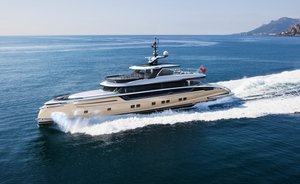
EDITOR'S PICK
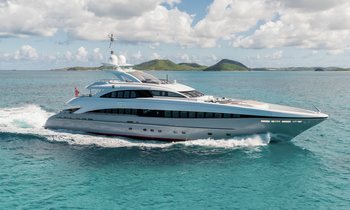
Latest News

28 March 2024

27 March 2024

26 March 2024
- See All News
Yacht Reviews
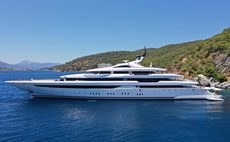
- See All Reviews

Charter Yacht of the week
Join our newsletter
Useful yacht charter news, latest yachts and expert advice, sent out every fortnight.
Please enter a valid e-mail
Thanks for subscribing
Featured Luxury Yachts for Charter
This is a small selection of the global luxury yacht charter fleet, with 3576 motor yachts, sail yachts, explorer yachts and catamarans to choose from including superyachts and megayachts, the world is your oyster. Why search for your ideal yacht charter vacation anywhere else?

136m | Lurssen
from $4,320,000 p/week ♦︎
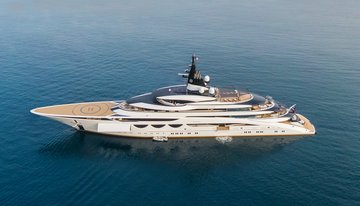
115m | Lurssen
from $2,808,000 p/week ♦︎
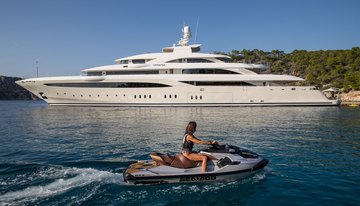
85m | Golden Yachts
from $972,000 p/week ♦︎
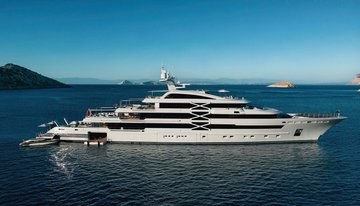
88m | Golden Yachts
from $1,188,000 p/week ♦︎
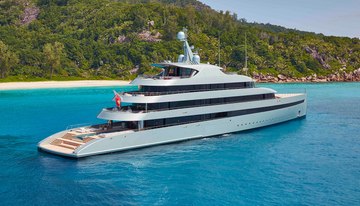
84m | Feadship
from $1,080,000 p/week ♦︎

93m | Feadship
from $1,512,000 p/week ♦︎

Maltese Falcon
88m | Perini Navi
from $490,000 p/week
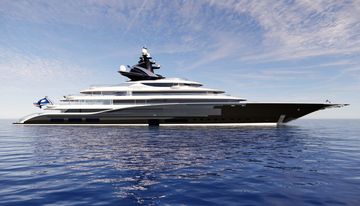
122m | Lurssen
from $3,000,000 p/week
As Featured In
The YachtCharterFleet Difference
YachtCharterFleet makes it easy to find the yacht charter vacation that is right for you. We combine thousands of yacht listings with local destination information, sample itineraries and experiences to deliver the world's most comprehensive yacht charter website.
San Francisco
- Like us on Facebook
- Follow us on Twitter
- Follow us on Instagram
- Find us on LinkedIn
- Add My Yacht
- Affiliates & Partners
Popular Destinations & Events
- St Tropez Yacht Charter
- Monaco Yacht Charter
- St Barts Yacht Charter
- Greece Yacht Charter
- Mykonos Yacht Charter
- Caribbean Yacht Charter
Featured Charter Yachts
- Maltese Falcon Yacht Charter
- Wheels Yacht Charter
- Victorious Yacht Charter
- Andrea Yacht Charter
- Titania Yacht Charter
- Ahpo Yacht Charter
Receive our latest offers, trends and stories direct to your inbox.
Please enter a valid e-mail.
Thanks for subscribing.
Search for Yachts, Destinations, Events, News... everything related to Luxury Yachts for Charter.
Yachts in your shortlist

Home > VAT Guide by sector > Yachts, charters & VAT
Yachts, charters & VAT
Understand intra-community vat regulations.
How are charters from one or more EU Member State taxed? What are the VAT rules for charters ? When should you appoint a fiscal representative or tax advisor?

A summary by the experts
Charters lasting less than 90 days departing from an EU Member State are subject to VAT at the place where the yacht is made available , on the date the contract starts, whether or not the passengers are on board.
Some Member States have opted, as authorised by the European VAT Directive, not to tax charter fees for the part of the hire which corresponds to the segment of the navigation carried out outside of EU waters. This is the case in France and Italy. The methods of calculating the tax basis, and therefore the non-taxable part of the fees, differ from country to country. In order to benefit from these provisions, yachts must provide evidence. What is required varies according to national regulations (logbooks, AIS tracking, etc.)
Charters lasting less than 90 days departing from a third country and passing through the territorial waters of certain EU Member States are subject to VAT on the part of the journey located within the EU waters of countries exercising this option.
The methods of calculation and proof also vary from one State to another.
Examples of charters in the Mediterranean
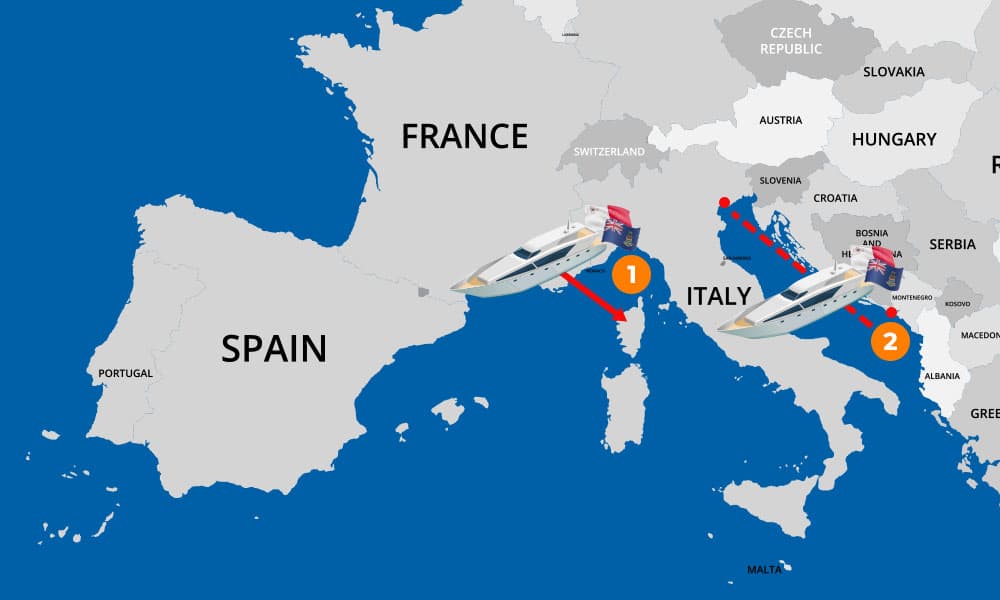
Charters from a European Union country (France) using international waters
You are a shipping company based in Malta . You organise charters from France . One of your clients is planning a stopover in Corsica . This route uses international waters (more than 12 nautical miles).
- Until 31st October 2020 , charter fees were taxable in proportion to the use of the vessel in EU territorial waters. As this share became difficult to determine, the ship hiring client could apply a flat-rate reduction of 50% on the total amount of the fee, regardless of the nature of the vessel concerned.
- As of 1st November 2020 , hire fees are in principle fully taxable in France. However, the part of the fee corresponding to the proportion of the actual use or operation of the vessel outside the territorial waters of the EU is exempt from VAT under Article 59a of Council Directive 2006/112/EC of 28 November 2006 on the common system of value added tax. It is the taxpayer’s responsibility to assess the part of the fee that is exempt and this can be subject to inspection by the authorities. The taxpayer may corroborate the assessment by any means.
You need a tax representative to register for VAT and file your VAT returns in France with the required documents.
Charters from outside the European Union (Montenegro) using Community waters (Italy)
You are a shipowner based in Malta and are organising a charter from Montenegro. One of your clients is planning to sail in Italian waters .
As Italy has opted to tax the part of the charter located in Italy (based on the time spent in Italian waters), you will have to pay Italian VAT on this part of the charter.
You need a tax representative to register for VAT and file VAT returns in Italy with the required documents.
These examples are given to clarify VAT mechanisms and explain your obligations. It is worth checking the regulations for your particular transactions in line with the law, doctrine and practices in each of the EU member States. Contact us for more information!
Why do you need a fiscal representative?
A tax advisor or fiscal representative can register for VAT on your behalf and help you fulfil your obligations in each of your charter’s departure countries.
European regulatory references
Hiring means of transport.
1. The place of short-term hiring of a means of transport shall be the place where the means of transport is actually put at the disposal of the customer.
2. The place of hiring, other than short-term hiring, of a means of transport to a non-taxable person shall be the place where the customer is established, has his permanent address or usually resides.
However, the place of hiring a pleasure boat to a non-taxable person, other than short-term hiring, shall be the place where the pleasure boat is actually put at the disposal of the customer, where this service is actually provided by the supplier from his place of business or a fixed establishment situated in that place.
3. For the purposes of paragraphs 1 and 2, ‘short-term’ shall mean the continuous possession or use of the means of transport throughout a period of not more than thirty days and, in the case of vessels, not more than 90 days.
Source: Article 56 of the Directive 2006/112/EC
Prevention of double taxation or non-taxation
In order to prevent double taxation, non-taxation or distortion of competition, Member States may, with regard to services the place of supply of which is governed by Articles 44, 45, 56, 58 and 59:
(a) consider the place of supply of any or all of those services, if situated within their territory, as being situated outside the Community if the effective use and enjoyment of the services takes place outside the Community;
(b) consider the place of supply of any or all of those services, if situated outside the Community, as being situated within their territory if the effective use and enjoyment of the services takes place within their territory.
However, this Article shall not apply to electronically supplied services where those services are supplied to non-taxable persons established outside the Community.
Source: Article 59a of the Directive 2006/112/EC
Registering for VAT
1. Member States shall take the measures necessary to ensure that the following persons are identified by means of an individual number:
(a) every taxable person, with the exception of those referred to in Article 9(2), who within their respective territory carries out supplies of goods or services in respect of which VAT is deductible, other than supplies of goods or services in respect of which VAT is payable solely by the customer or the person for whom the goods or services are intended, in accordance with Articles 194 to 197 and Article 199;
(b) every taxable person, or non-taxable legal person, who makes intra-Community acquisitions of goods subject to VAT pursuant to Article 2(1)(b) and every taxable person, or non-taxable legal person, who exercises the option under Article 3(3) of making their intra-Community acquisitions subject to VAT;
(c) every taxable person who, within their respective territory, makes intra-Community acquisitions of goods for the purposes of transactions which relate to the activities referred to in the second subparagraph of Article 9(1) and which are carried out outside that territory.
(d) every taxable person who within their respective territory receives services for which he is liable to pay VAT pursuant to Article 196;
(e) any taxable person who is established within their respective territories and who, within the territory of another Member State, supplies services for which only the customer is liable to pay VAT pursuant to Article 196.
2. Member States need not identify certain taxable persons who carry out transactions on an occasional basis, as referred to in Article 12.
Source – Article 214 of the Directive 2006/112/EC
Fiscal representation
A simple, reliable and efficient solution for all your VAT obligations in all EU countries and some non-EU countries.
Contact an expert
Easytax International assists you and takes care of all your VAT and customs operations in the complex yachting sector.

For all European Union countries and some third countries.
For all European Union countries and some third countries. For all your VAT, Intrastat & ESL obligations, and your VAT recovery requests.
Get the latest news on VAT regulations in Europe directly in your mailbox.
We respect your personal data
Easytax acts as a VAT agent and fiscal representative in the 27 European Union countries and some third countries for companies with international VAT issues. More >
VAT Services
- Fiscal representation across Europe
- VAT Online Simulator
- Foreign VAT recovery
- OSS, IOSS: outsource your VAT One-Stop-Shop’s management
- A Guide to intra-Community VAT
- VAT Guide by Industry

© Easytax 2021 – Legal Info, T&C – Cookies – Personal Data

IMAGES
COMMENTS
All privately owned vessels used by EU residents within the EU are required to pay a Value Added Tax (VAT), which can add a hefty 20 percent to your sales price. And that's just the beginning of all the details to consider. Above: VAT on yachts can add a hefty amount to the price tag. Ed Kukla photo.
Yes - an EU VAT paid yacht can lose its VAT paid status. Examples of how a yacht might lose its VAT paid status include: - The VAT paid is reclaimed (i.e. where the owner was VAT registered and able to reclaim the VAT they paid on vessel purchase); or - The vessel is sold whilst physically located outside the VAT territory of the EU; or
vat tax on a yacht in the european union. All EU residents who own a boat and use the boat within the EU are required to pay a 20 % Value Added Tax (VAT), which will hike up the sales price considerably. It's important not to underestimate the complexity of VAT on vessels, especially for higher value yachts. As a matter of course when you ...
An EU national may establish residence outside the EU VAT zone, for example BVI or Gibraltar, and thereby avail himself of the temporary importation relief from VAT. ... Non-EU vessels. A VAT paid yacht will encounter no difficulties in EU waters provided the vessel is not chartered. Pleasure yachts built pre-1985 and in EU waters on 31st ...
As with yachts built after 1985, an original invoice showing VAT payment to an EU authority is the preferred evidence of VAT payment (if it is still available). Once in "free circulation" a yacht built before 1 January 1985 is treated as any other boat in connection with the Brexit related changes in VAT status arising from location on 31 ...
Double VAT, the Schengen zone, the 180-day rule; the list of considerations when considering buying a yacht in Europe is long and, in some cases, very complex. Crucial to understanding is having a ...
Value Added Tax (VAT) is a tax scheme that was established by the EU. ... It should be noted that the Channel Islands and Gibraltar are considered outside of the EU VAT area but the Isle of Man is. A yacht owned by an EU resident or corporate body has the right to free movement throughout the EU provided VAT has been paid on that boat in an EU ...
Yes, there are two, one being the Malta yacht leasing arrangements, that is based on the concept of "use and enjoyment" clause in the VAT Directive and which provides for the taxation of only that portion of the lease where the yacht is used and enjoyed within EU territorial waters. Conversely the use outside EU territorial waters is not taxed.
A European purchasing a non VAT paid yacht will only pay VAT on the purchase price. There remain huge advantages to having a non VAT paid yacht and keeping her in Europe on the TA scheme as when she sells, the buyer will only pay on the purchase price. The advantage here is that the yacht pays VAT just once (rather than a UK VAT paid yacht ...
Older vessels built before 1985 are deemed VAT paid if they were in the EU on December 31, 1992, providing there's paperwork to support both dates. For age this could be a marine survey, Part 1 registration, insurance documents or a builder's certificate, while receipts for mooring or winter storage would satisfy the location requirement.
One of the most recent changes to VAT in Europe, as of summer 2023, Turkey has increased its VAT rate from 18% to 20%. For charters in Turkey, on Turkish-flagged commercial vessels, 20% VAT is applied to the charter fee. For foreign flagged commercial vessels chartering in Turkey VAT is 0%. But it's essential to note that while vessels under 39 ...
Charter Contracts that start in France are due to the standard VAT rate of 20%, applicable for the duration of the yacht's stay in EU waters. That being said, if the yacht is in international ...
1. What is the general guideline for yachts and EU VAT? Unless the owner is eligible for a customs relief, such as Temporary Admission, or is eligible for a VAT exemption, such as the operation of the vessel for legitimate commercial purposes, all yachts sailing within EU waters shall pay EU VAT. Pay VAT if unsure. 2.
guarantee to cover the payment of the customs duties and VAT that become due if the boat does not leave the EU. How long can the yacht stay in the EU? Normally, you can use the vessel in the EU for one and a half years. In technical terms, the period for discharge for privately used means of sea and inland waterway transport is 18 months. This ...
Up to that point, they considered the supplies, fuel, charters, and even the hull of commercial yachts engaged in trade exempt from VAT. At the end of 2010, though, the European Court of Justice determined that a yacht chartered by a customer for leisure is no longer a VAT-exempt transaction. Consequently, VAT on superyacht charters of less ...
The place the yacht is purchased and the owner's place of residence will determine what tax and duties may be due upon purchase. These are usually VAT and transfer tax or import duties. In general terms, any EU resident who buys a new build or secondhand yacht that is not VAT-paid will be required to pay VAT on the hull at the VAT rate ...
The VAT treatment of any sale of the yacht (by the lessor or by any other person) will depend on the place where the sale takes place for VAT purposes. If the sale takes place in Malta, 18% VAT would be due on the consideration charged for the sale. Conversely, no Maltese VAT would be chargeable by a seller of a yacht in Malta if the seller had ...
Boat leaves EU27 (for GB or elsewhere) and then returns to the EU27. RGR & EU VAT Paid Status - Boat is eligible to RGR on return to the EU27 and will have EU VPS, provided that all the conditions established in Article 203 UCC are fulfilled and, for VAT, that the boat is imported by the same person who exported it.
This means that for yacht charters that start on the tranquil shores of France or Monaco, you can expect a standard rate of 20% VAT (as well as any delivery or redelivery fees incurred). It's also worth remembering new COVID regulations for French waters have also come into effect this year. As of January 23 2021, all guests on board charters ...
The new owner of the yacht does not have to pay VAT. However, if the vessel is permanently located within the borders of the European Union or will be operated within the EU, paying value-added tax is mandatory for non-European residents. The payable tax depends on the country where the yacht is located. The average rate is 20%.
A summary by the experts. Charters lasting less than 90 days departing from an EU Member State are subject to VAT at the place where the yacht is made available, on the date the contract starts, whether or not the passengers are on board. Some Member States have opted, as authorised by the European VAT Directive, not to tax charter fees for the ...
These special rates apply to EU countries that were applying them on 1 January 1991. They were originally meant to be transitional arrangements for a smoother shift to the EU VAT rules when the Single Market came into force on 1 January 1993, and were intended to be gradually phased out. There are 3 types of special rates: Super-reduced rates.
VIES (VAT Information Exchange System) is a search engine (not a database) owned by the European Commission. The data is retrieved from national VAT databases when a search is made from the VIES tool. The search result that is displayed within the VIES tool can be in one of two ways; EU VAT information exists ( valid) or it doesn't exist ...